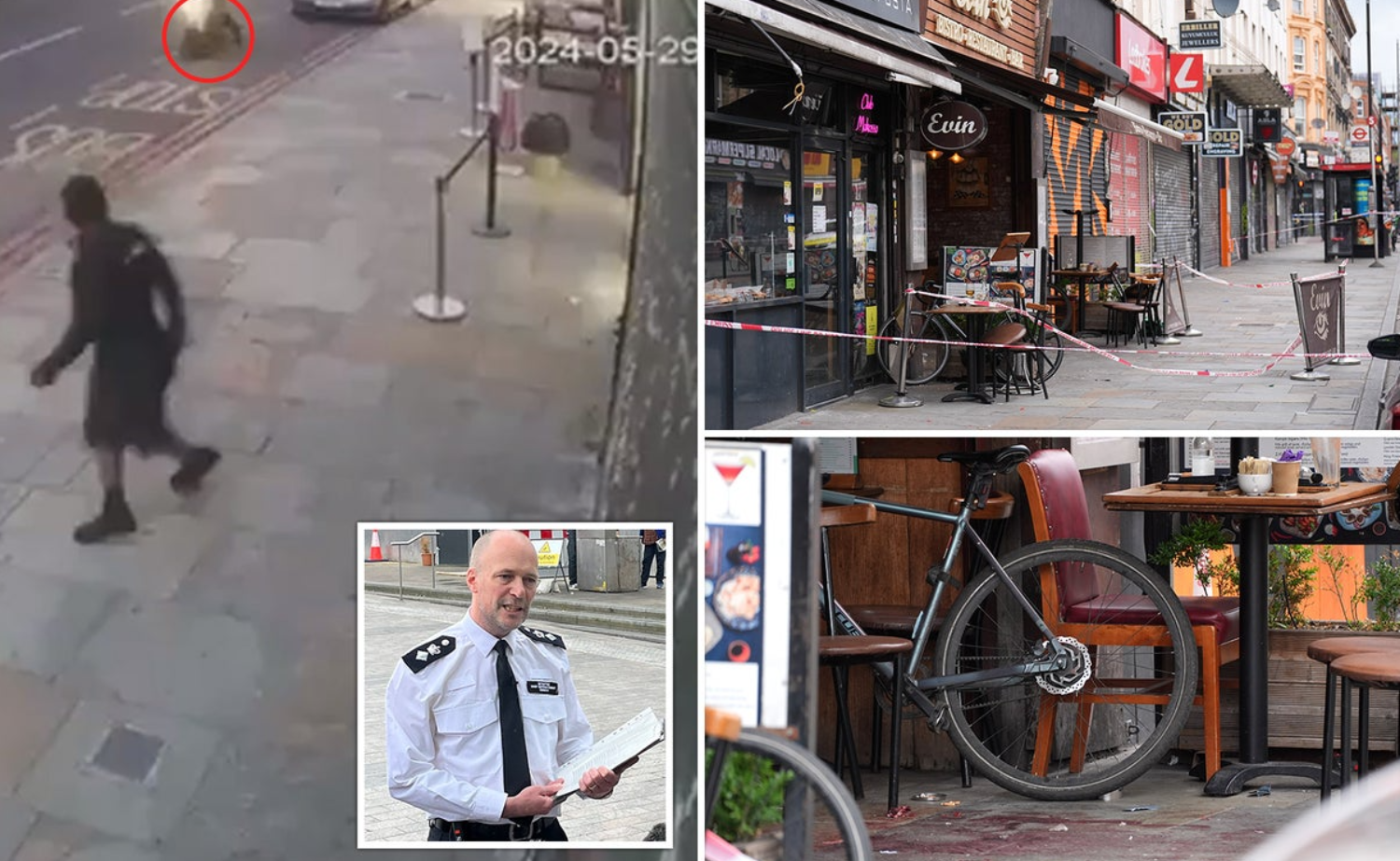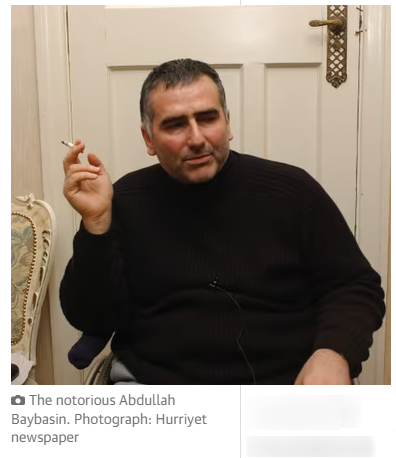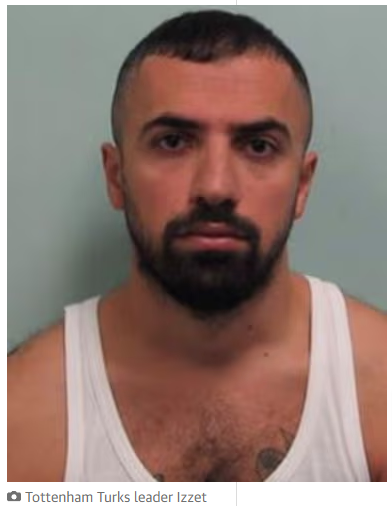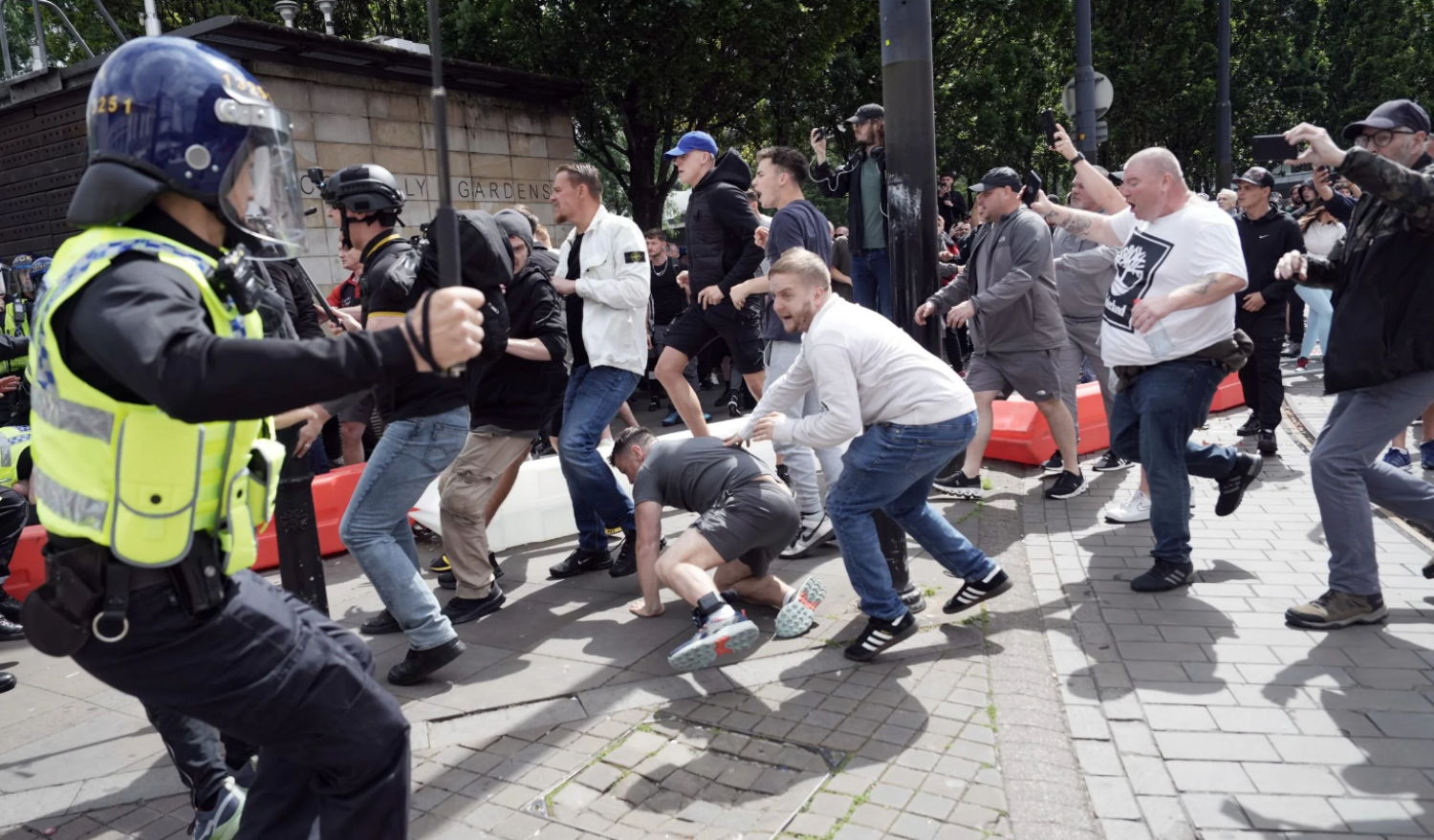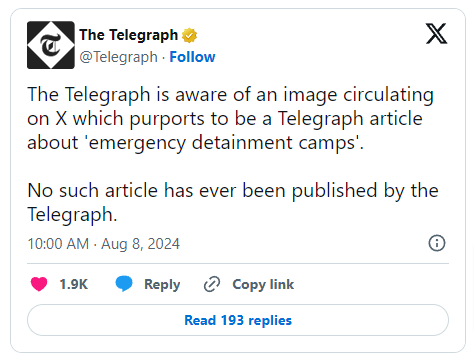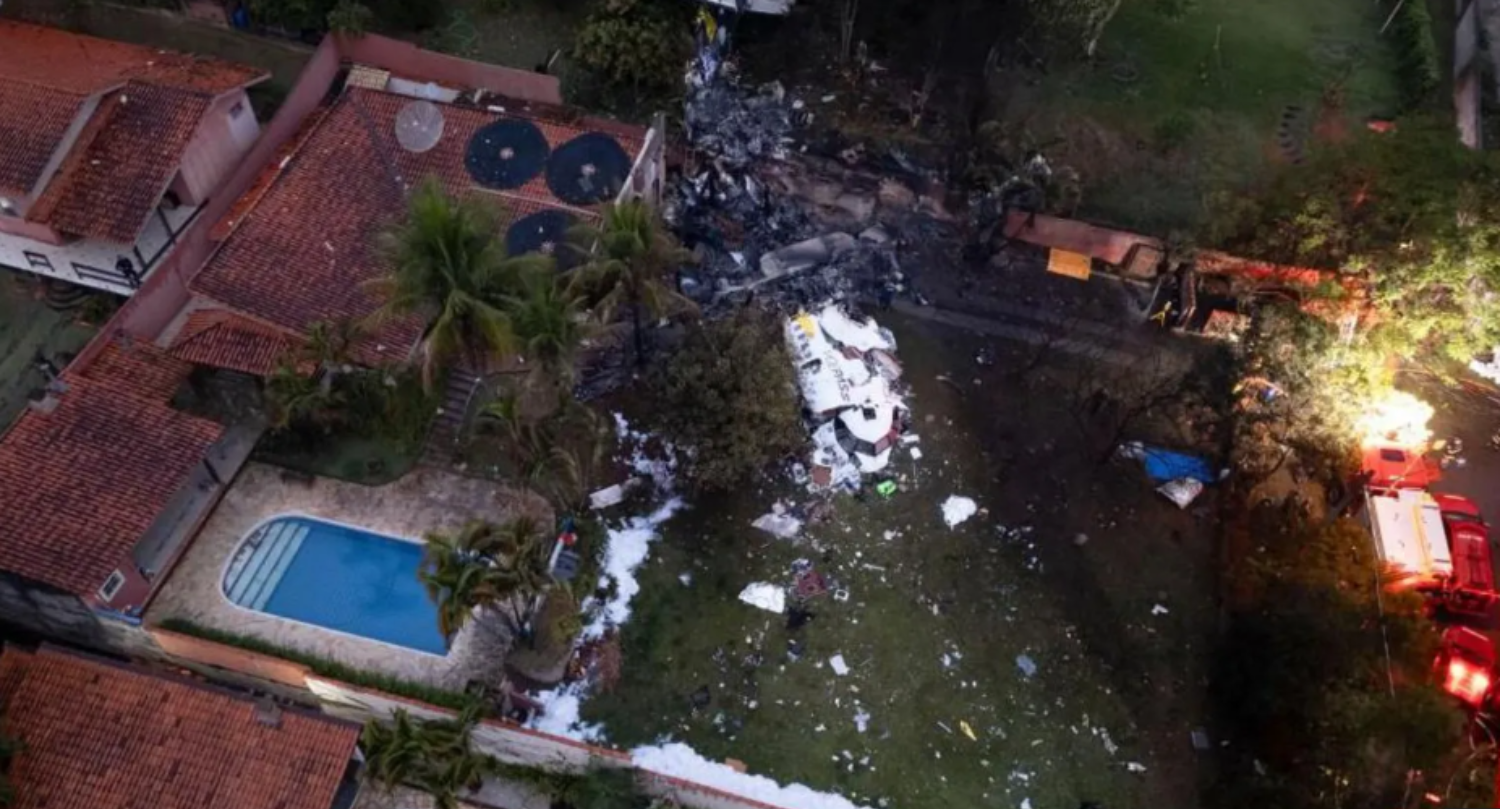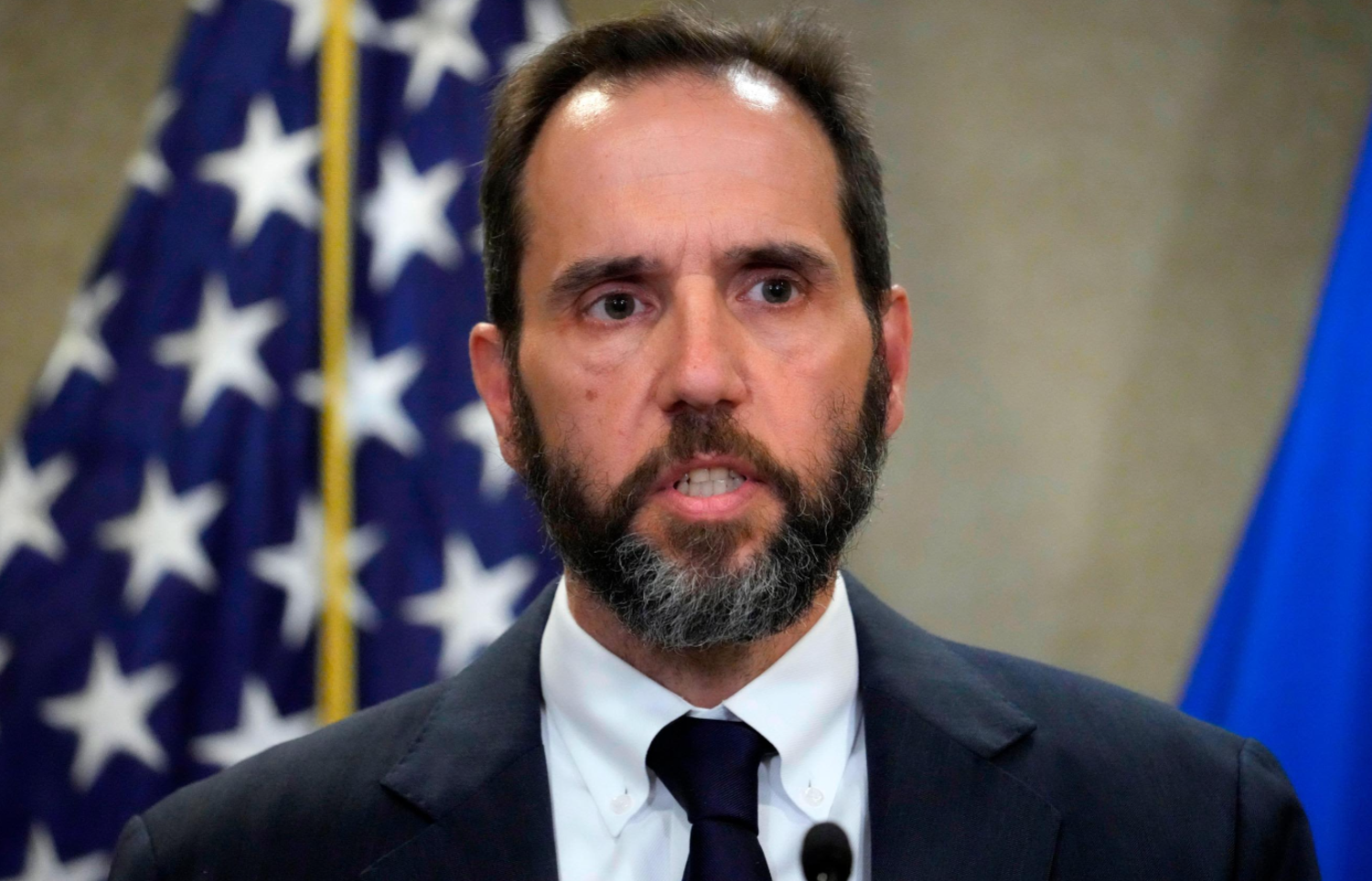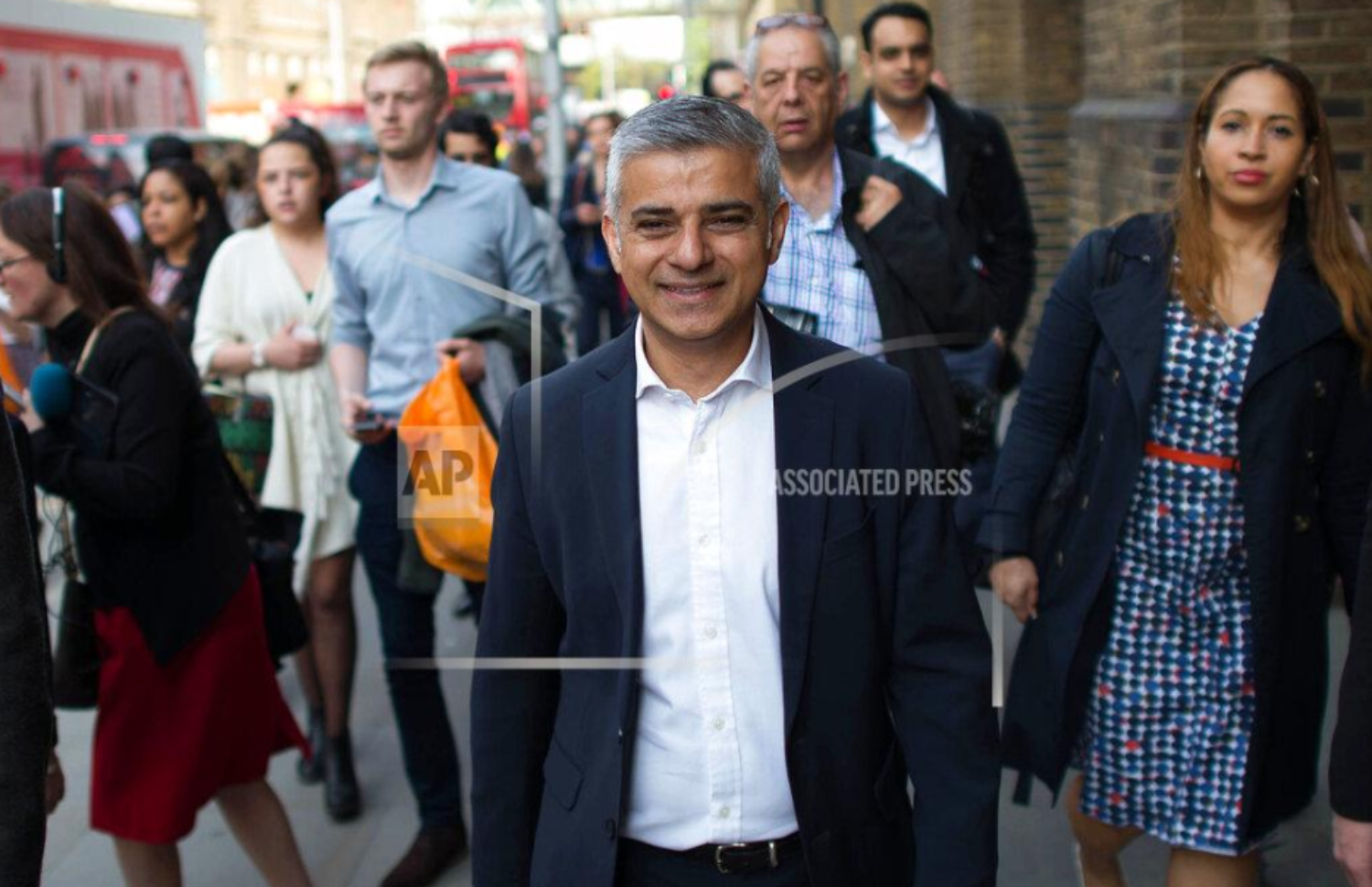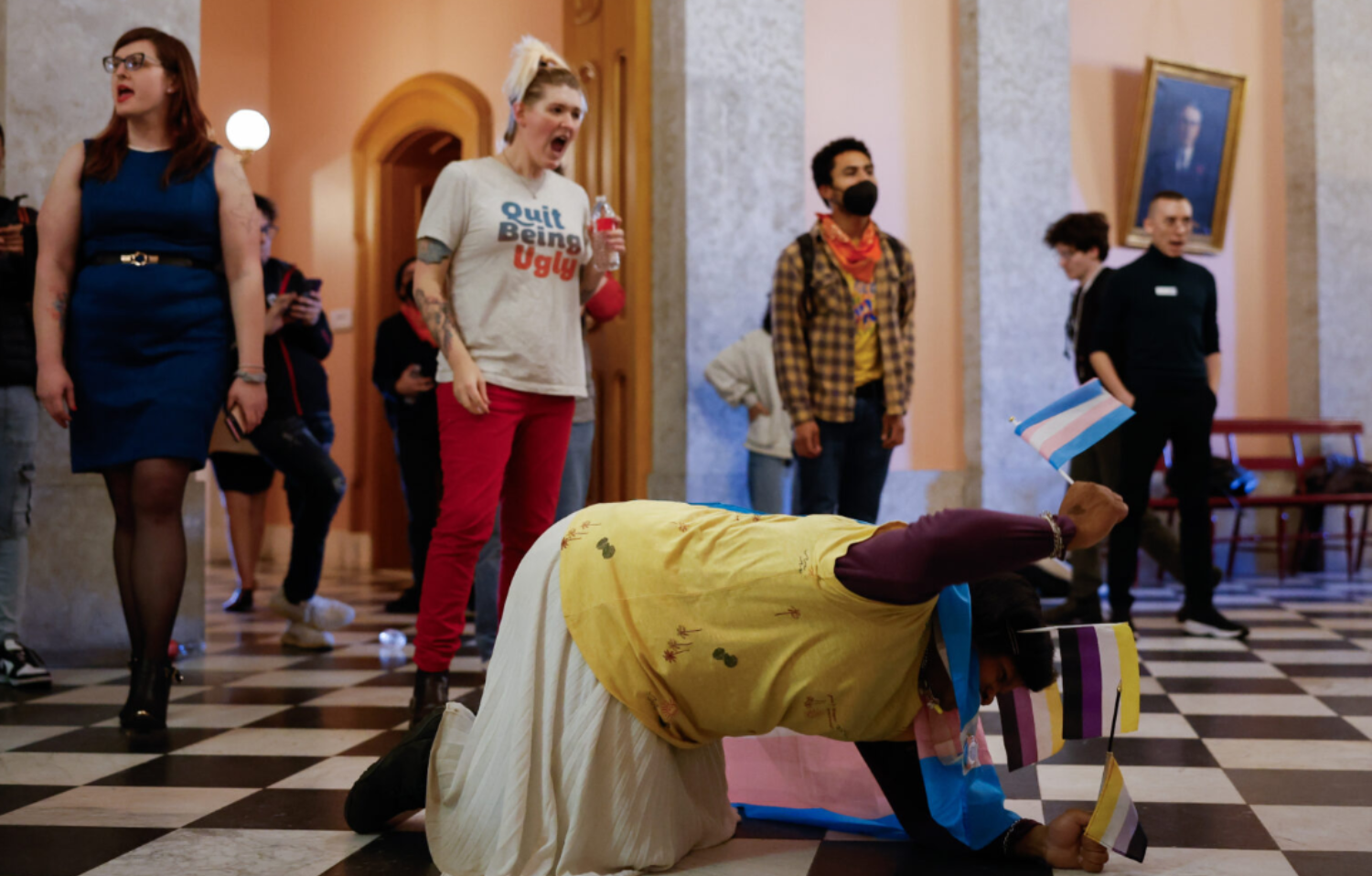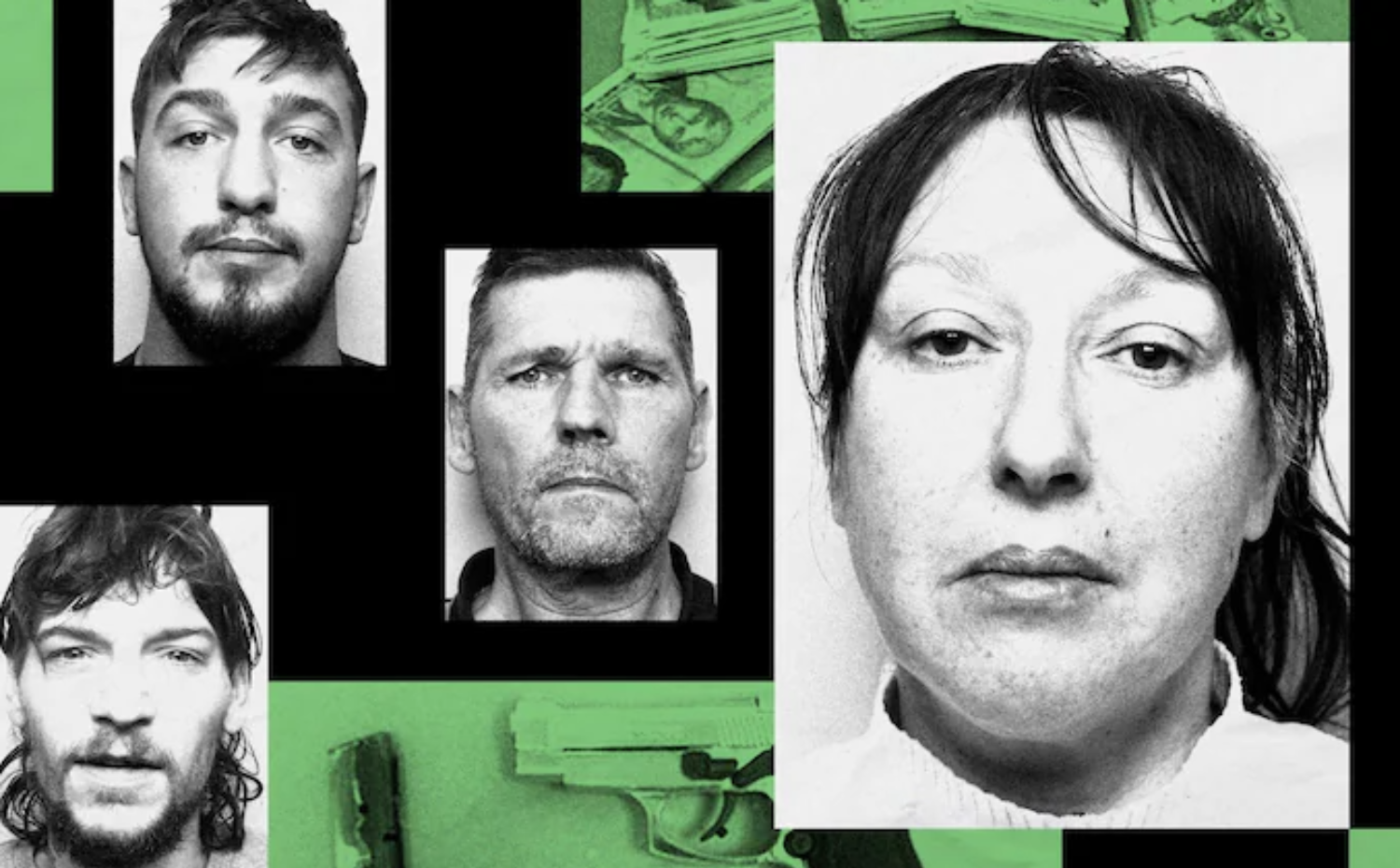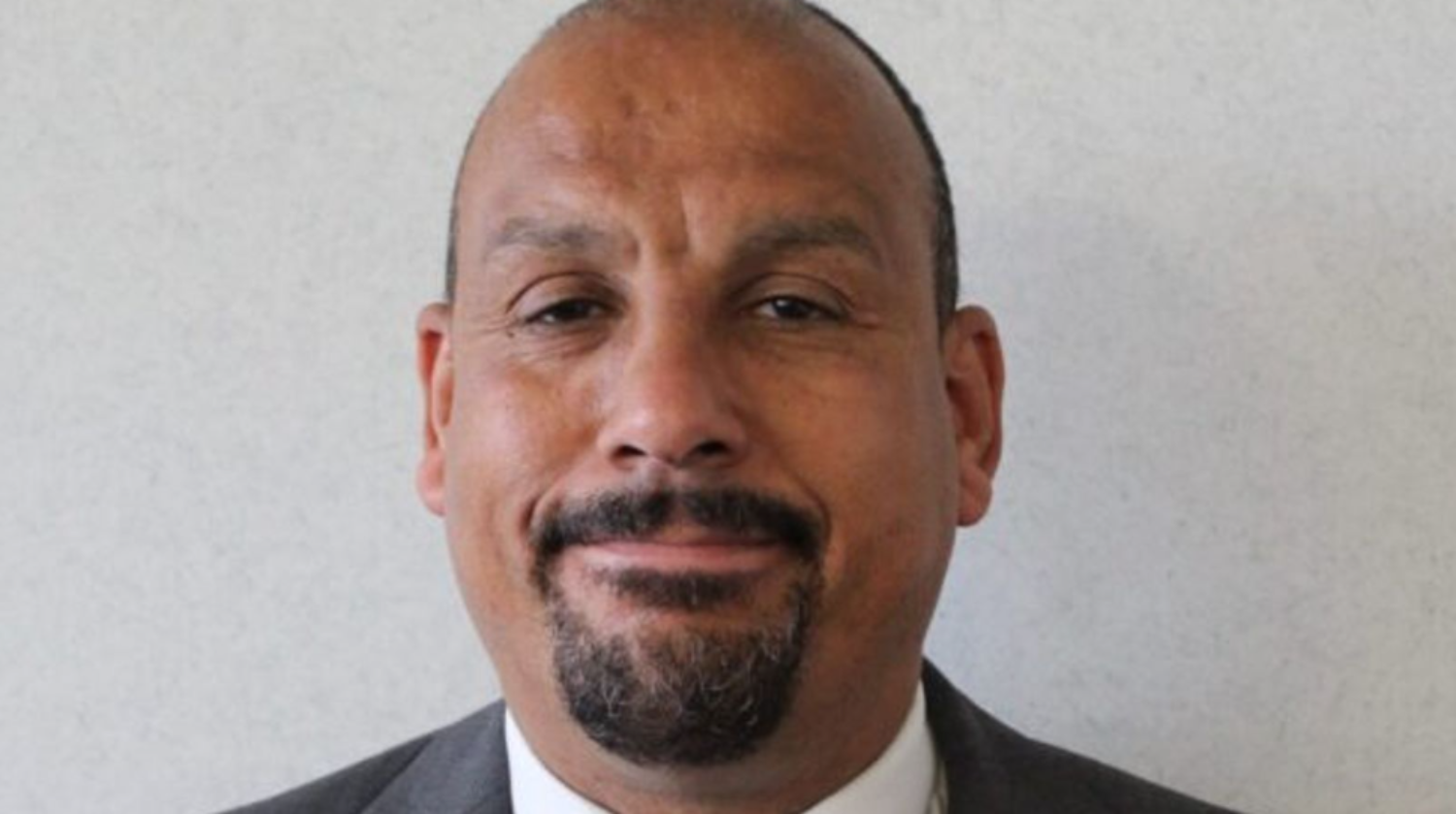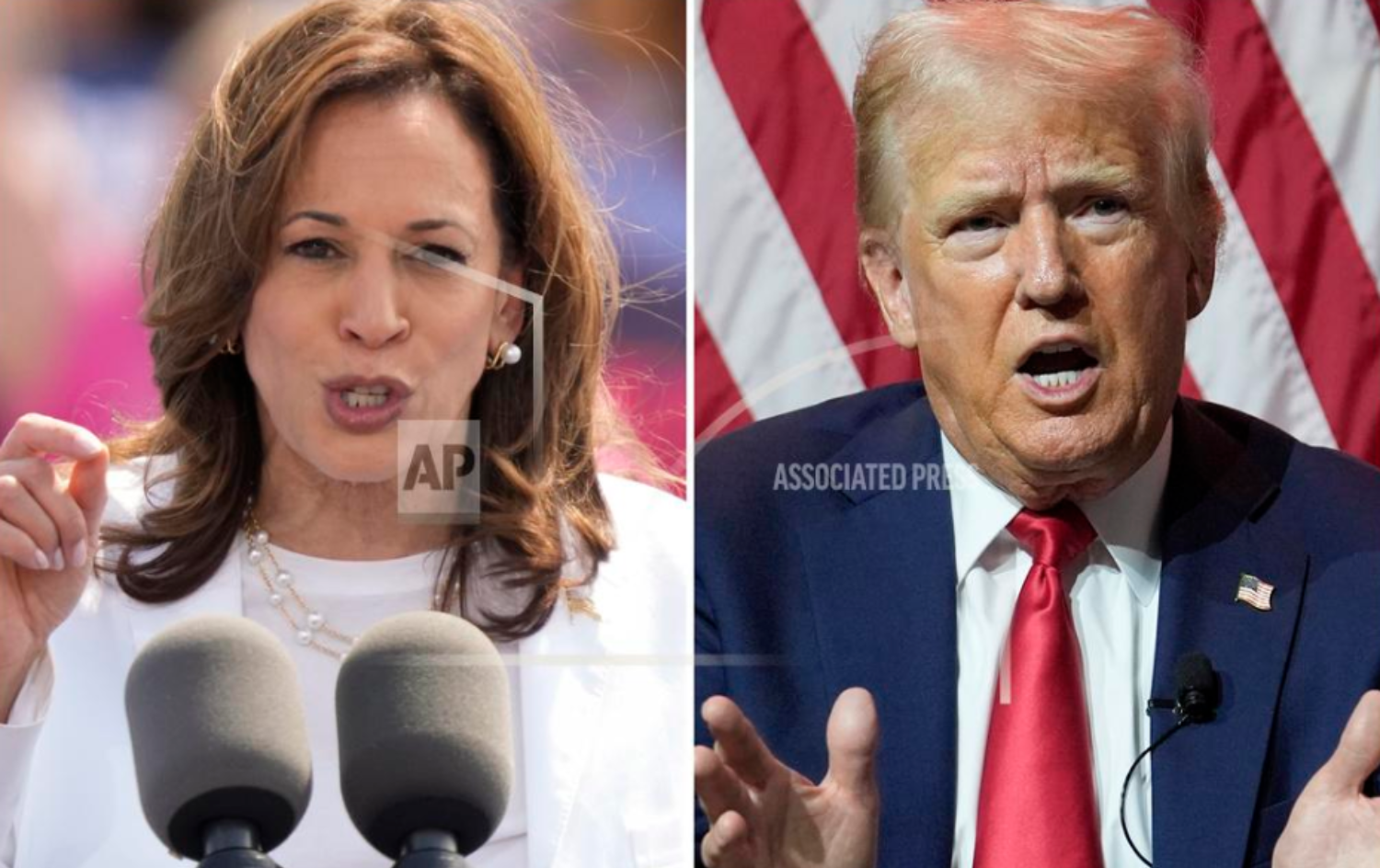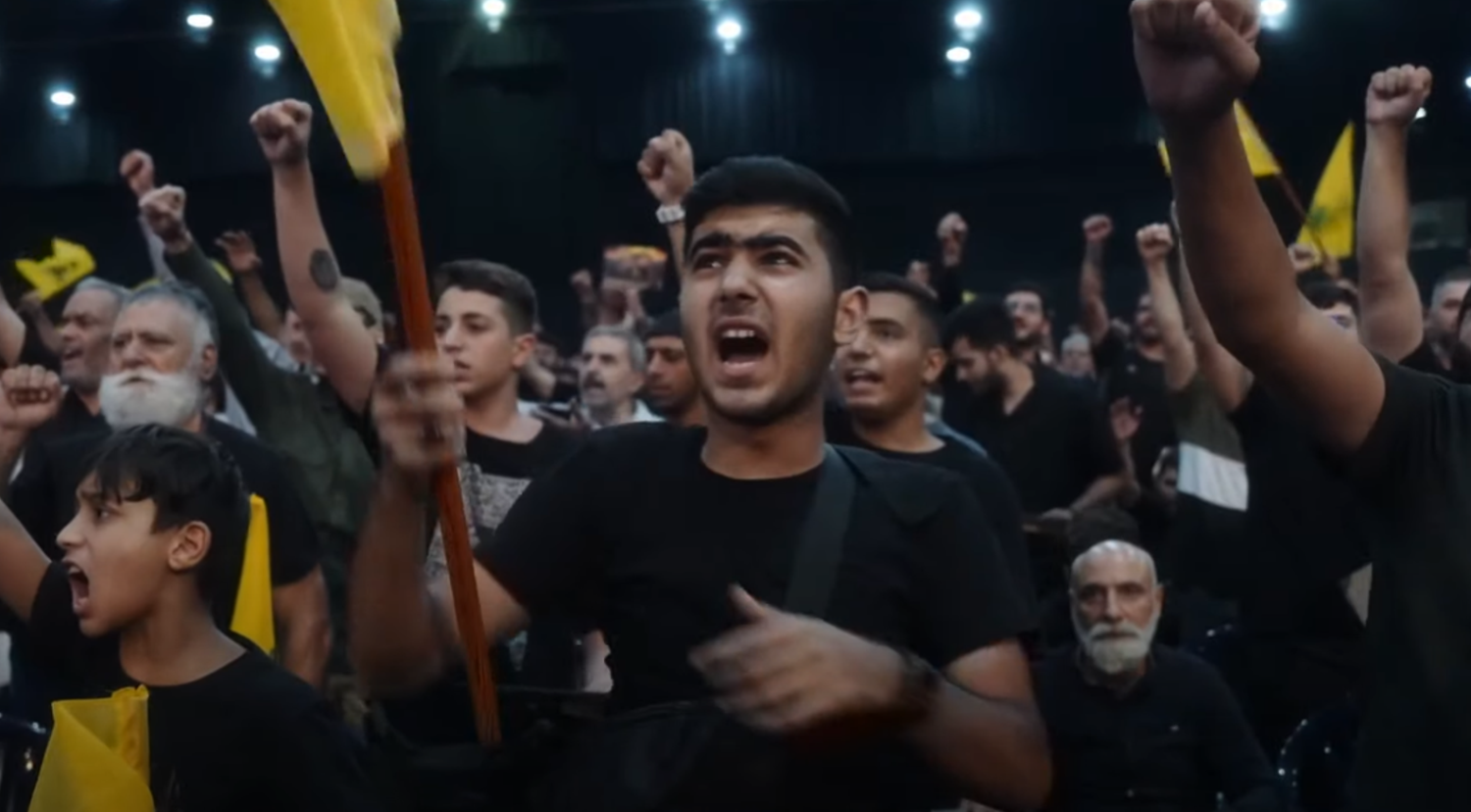-
Posts
10,734 -
Joined
-
Last visited
Content Type
Events
Forums
Downloads
Quizzes
Gallery
Blogs
Everything posted by Social Media
-
Former President Donald J. Trump once again found himself at the center of controversy as he insisted that he had been involved in a dangerous helicopter landing alongside Willie Brown, the former mayor of San Francisco. Trump claimed he possessed records to substantiate his assertion, despite Brown’s categorical denial of the event. The former president’s comments were made during an impassioned phone call to a New York Times reporter. Trump, who had been forced to land his plane several hours away from his planned rally in Bozeman, Montana, due to a mechanical issue, was furious over The Times' coverage of his news conference held the previous day at Mar-a-Lago, his private club and residence. During that conference, Trump recounted an emergency helicopter landing he claimed to have experienced with Willie Brown. However, Willie Brown firmly denied ever having flown in a helicopter with Trump. The former mayor’s denial raised questions about the accuracy of Trump’s recollection, with some speculating that the former president may have confused Willie Brown with Jerry Brown, the former governor of California. In 2018, Trump did indeed travel by helicopter with Jerry Brown while surveying wildfire damage in the state. But, according to Jerry Brown, there was no emergency landing during that trip, and no discussion took place concerning Vice President Kamala Harris. Willie Brown, who had a personal relationship with Kamala Harris during the 1990s, was acquainted with Trump in a professional capacity during that period when Trump was a New York developer working on various projects. According to a biography of Harris titled "Kamala’s Way: An American Life," Trump once sent his private plane for Brown and Harris in 1994 to transport them from Boston to New York City. Despite these past connections, Brown's denial of the helicopter incident did not deter Trump. On Friday, Trump doubled down on his claim, stating emphatically, “We have the flight records of the helicopter.” He further claimed that the helicopter had landed "in a field" and hinted at releasing the supposed flight records. At one point during the call, Trump threatened to sue over The New York Times article, exclaiming that he was “probably going to sue.” When pressed by the reporter to produce the flight records, Trump mocked the request, repeating it in a sing-song voice. By early Friday evening, no records had been provided. This episode is not the first time Trump has claimed to have evidence to back up his statements, only to fail to produce it. The helicopter story is one he has shared before, including in his 2023 book, "Letters to Trump," in which he published correspondence he had received from various individuals, including Willie Brown. In the book, Trump wrote, "We actually had an emergency landing in a helicopter together. It was a little scary for both of us, but thankfully we made it." As the saga continues, questions about the veracity of Trump's helicopter story remain unanswered, with no flight records forthcoming and no corroboration from Willie Brown. Yet, as is often the case with Trump, the lack of evidence has done little to temper his conviction or his willingness to publicly double down on his claims. Whether or not the former president will follow through on his threat to sue remains to be seen, but for now, the disputed helicopter ride remains yet another chapter in the long list of controversies surrounding Donald J. Trump. Credit: NYT 2024-08-12 Get our Daily Newsletter - Click HERE to subscribe Cigna offers a variety of health insurance plans designed to meet the minimum requirement for medical treatment coverage, with benefits reaching up to THB 3 million. These plans are tailored to provide comprehensive healthcare solutions for expatriates, ensuring peace of mind and access to quality medical services. To explore the full range of Cigna's expat health insurance options and find a plan that suits your needs, click here for more information.
-
A series of violent and public shootings across Europe has exposed a growing and deadly conflict within the Turkish underworld, one that seems to be spreading its tentacles far beyond the borders of Turkey. An Observer investigation has revealed a disturbing pattern of escalating violence, suggesting a broader Europe-wide battle between rival drug gangs with roots in Turkey. This wave of violence has already claimed several lives and has left a nine-year-old girl in London’s Hackney district hospitalized after being caught in the crossfire of what appears to be a targeted gang attack. The chilling events that have unfolded over the past few months began in Barcelona, where a seemingly ordinary spring day turned deadly. On a busy Saturday afternoon, diners filled the popular restaurants of the Diagonal Mar neighborhood. Among them were four men who had just sat down for lunch at a restaurant on Llull Street. One of them received a phone call and stepped outside, unaware that it would be his last. As he walked 80 meters along the road, the sound of five gunshots shattered the hum of traffic, and four bullets struck him in the head, killing him instantly. Just three weeks later, on May 29, another shooting occurred, this time in Hackney’s Kingsland High Street in northeast London. At 9:20 p.m., a motorcycle pulled up outside the Evin Cafe, where three men were sitting. The rider opened fire, wounding all three men. Tragically, one of the bullets also struck a nine-year-old girl who was waiting for ice cream with her family. She remains in the hospital, her life forever changed by the violence that erupted around her. The violence didn’t stop there. Six weeks later, in Chisinau, the capital of Moldova, yet another shooting took place. This time, the target was a middle-aged man sitting on the terrace of a crowded cafe. CCTV footage captured the chilling moment a figure in a motorcycle helmet approached the man and fired seven shots into his head and back. The brazenness of these attacks is striking, and they all appear to be connected, according to European law enforcement officials. Pan-European police investigators believe that these shootings are all linked to a violent schism within the Turkish underworld, specifically between rival factions involved in the heroin trade. The two men who were killed in Barcelona and Chisinau were reportedly high-ranking members of some of Europe’s most feared drug gangs. Simon Harding, director of the UK’s National Centre for Gangs Research and an adviser to the Home Office, stated that the shootings in Spain, the UK, and Moldova were “clearly linked.” In London, detectives are investigating what appears to be a festering feud between two of the city’s longstanding drug syndicates, centered around the botched Hackney shooting. Their focus is on a small area of northeast London, where a decades-old rivalry between two Turkish and Kurdish gangs has erupted into violence once more. The Hackney-based Bombacilar and the Tottenham Turks have been locked in a brutal battle for control of Britain’s heroin trade, with each side retaliating against the other in a spiral of violence. However, the recent bloodshed may signal more than just the continuation of a local turf war. Experts and police sources involved in an investigation by the Organized Crime and Corruption Reporting Project (OCCRP) and the Observer suggest that the violence marks a new and dangerous chapter in the Turkish heroin trade. They warn that a new era of gangland violence is unfolding across Europe, characterized by audacious killings in public places. Europol, the European Union’s law enforcement agency, has confirmed that it is supporting investigations into the recent shootings, which it says are part of a broader trend of escalating violence among criminal groups spilling into public places. Claire Georges, Europol’s deputy spokesperson, noted that there is currently intense competition among criminal groups for control of markets and geographical territories. “Before, the violence was more limited to transit points or transport hubs. Now we’re seeing it in the streets, and this is why law enforcement is taking it very seriously,” she said. The challenge for law enforcement agencies across Europe is to anticipate where and when the next assassination will occur. Even the highest ranks of the Hackney Bombacilar and the Tottenham Turks might not know whether the killing is over or if it is just beginning. The recent wave of violence may be driven by a shortage of heroin, as Afghanistan’s Helmand province, once the world’s largest producer of opium, has seen its production plummet by 99% following a Taliban ban on poppy cultivation in April 2022. This sudden shortage of raw material has had profound repercussions for rival gangs, who are now fighting over what little heroin remains. Ian Broughton, a former detective with London’s Metropolitan Police and an expert on UK drug gangs, believes that the shortage of heroin is fueling the violence. “If we have a shortage of heroin, they will likely be fighting for control of the heroin that remains,” he said. “It’s a perfect scenario for the violence to escalate. That is exactly what we are seeing.” Simon Harding added that the situation is akin to what might happen during a blockade of the Suez Canal, with organized crime syndicates facing a squeeze on their supply chains. “Organized crime is just big business,” he said. The Turkish gangs at the center of this conflict have long dominated the heroin trade in Europe, according to a Spanish police investigator who has spent two decades combating heroin trafficking. Speaking on condition of anonymity, the investigator described the current situation as a “war between clans” and confirmed that Turkish gangs are the “masters of heroin in Europe.” In May, Europol announced that an Italian-led investigation had resulted in the arrest of 17 Turkish nationals involved in murders across Europe, though few details were provided. The violence has not been limited to Europe. Last year, six members of an Istanbul-based Turkish gang were found dead in Greece, reportedly in revenge for the killing of a rival gang boss in Paris. Mahmut Cengiz, a Turkish associate professor with the Terrorism, Transnational Crime and Corruption Center and an expert on the Turkish underworld, predicts that the body count will continue to rise. “Given their operational capacity, dominance in crime sectors, and extensive global networks, I anticipate more assassinations as these groups compete for larger shares of the lucrative drug-trafficking market,” he said. Cengiz also confirmed that Turkish gangs have expanded their operations beyond heroin, diversifying into cocaine trafficking. “Recently, significant amounts of cocaine have been imported into Turkey from Latin America, facilitated by collaborations between Turkish criminal groups in Europe and within Turkey itself,” he said. The man killed in the Barcelona shooting on May 4 was Ilmettin Aytekin, a Turkish citizen also known as Tekin Kartal. Spanish police believe Kartal was a major Turkish mafia boss, though no record of any convictions could be found. A Spanish police source described him as “a big player” and suggested that his murder may have been the result of a settling of scores between gangs or a falling out with criminal associates. One intriguing detail about Kartal’s murder is that he was reportedly dining with a notorious figure from the Turkish mafia, Abdullah Baybasin, at the time of the shooting. Baybasin, a 64-year-old Turkish citizen who uses a wheelchair after being shot by a rival in the 1980s, is regarded as the founder of the Hackney Bombacilar, alongside his brothers. One of those brothers, Huseyin, known as “Europe’s Pablo Escobar,” is currently serving a life sentence in the Netherlands for drug smuggling. Baybasin was convicted in a British court in 2006 for conspiracy to supply heroin, with the Hackney outfit then said to be responsible for 90% of the heroin in the UK. However, he was acquitted of the drugs charge in 2010 and returned to Turkey, only to be arrested again and sentenced to 40 years in prison over a drug shipment. He was released in 2017 after the Turkish Supreme Court overturned his convictions. It remains unclear what relationship Kartal had with the Baybasin clan, but CCTV footage from another Barcelona restaurant shows that he dined with Baybasin the night before his death. In a video shared across various TikTok accounts, Abdullah Baybasin has denied any involvement in Kartal’s death or the subsequent London shooting. Huseyin Baybasin, in a website apparently updated by others, stated that the family found out about Kartal’s death days later but that he had never heard of him. Kartal’s murder has sparked a significant response on social media in Turkey, with many commenters praising him for helping people. However, his death is likely to have deadly implications. The three men targeted in the Hackney drive-by shooting have all since been released from the hospital, and all are believed to have ties to Baybasin’s Bombacilar, though police have not confirmed this. An obvious line of inquiry for the police is that the shootings were carried out or ordered by the Tottenham Turks, who have been involved in more than 35 major incidents, including three murders and 20 shootings, in their rivalry with the Bombacilar. Cengiz confirmed that tensions between the two gangs are rising, with the Tottenham Turks increasingly muscling in on the heroin market. “Recently conflicts have arisen between these groups due to the Tottenham Turks’ increasing involvement in heroin trafficking,” he said. The target of the third shooting, which took place outside a cafe in Moldova, was Izzet Eren, a senior leader of the Tottenham Turks. Moldovan police have described his murder as a settling of accounts between groups. Denis Rotaru, a Turkish organized crime prosecutor, revealed that multiple lines of inquiry are being pursued, including “conflicts between rival criminal groups.” However, there is another possibility: that Eren’s murder was an attempt to prevent him from testifying in a UK court. He had been the subject of an extradition request from the UK over drug-trafficking allegations and was arrested by Scotland Yard in Moldova two years ago after an international manhunt tracked him to Ukraine. “He came with the wave of refugees from Ukraine who were fleeing the war,” said Lilian Carp, president of the national security committee in Moldova’s parliament. Although extradition proceedings were underway, Eren was apparently released and is believed to have continued orchestrating his gang’s UK operations while on the run. Despite a series of interlinking European police investigations, none of the hitmen responsible for the recent shootings has been caught. Eren’s killer, according to Moldovan politicians, fled the country on the day of the shooting, crossing into Romania by minibus. “It was clear it was a contract killing and that the killer deliberately chose to shoot him in public at a cafe, not at his home,” said a Moldovan police source. Kartal’s murder has also led to no arrests, and no suspect has been publicly identified. Numerous appeals to Turkish and Kurdish communities in London have yielded no breakthrough. Harding, who advises the Home Office and the UK’s National Crime Agency, is not surprised at the apparent lack of progress. “We’re talking about high-level people that keep business well hidden – unless you are in their inner circle,” he said. However, there has been some progress in the Hackney shooting investigation. On Saturday, the Metropolitan Police announced that a man had been charged in connection with the attack. Javon Reily, 32, was arrested on Friday following a vehicle stop in Chelsea Embankment. Det Chief Supt James Conway described the charges as “a significant development in what has been a painstaking and meticulous investigation.” He added, “Our thoughts remain with our young victim and her family as they continue to confront the devastating effects of gun crime.” Credit: The Guardian 2024-08-12 Get our Daily Newsletter - Click HERE to subscribe Cigna offers a variety of health insurance plans designed to meet the minimum requirement for medical treatment coverage, with benefits reaching up to THB 3 million. These plans are tailored to provide comprehensive healthcare solutions for expatriates, ensuring peace of mind and access to quality medical services. To explore the full range of Cigna's expat health insurance options and find a plan that suits your needs, click here for more information.
-
Since Minnesota Governor Tim Walz emerged as the Democratic nominee for vice president, the Trump campaign and its allies have launched a series of attacks on his record, questioning his leadership during the 2020 protests, his stance on immigration, and even his role in the redesign of Minnesota's state flag. These claims, often steeped in exaggeration and misleading statements, seem aimed at undermining a rejuvenated campaign after President Joe Biden's decision to step aside, paving the way for Vice President Kamala Harris to lead the Democratic ticket. In this article, we will examine the accuracy of these claims and provide a clear picture of Tim Walz's record. The first claim under scrutiny comes from Senator JD Vance of Ohio, the Republican nominee for vice president, who stated, "Because if we remember the rioting in the summer of 2020, Tim Walz was the guy who let rioters burn down Minneapolis." This assertion is a significant exaggeration. While it is true that Governor Walz faced criticism for the perceived delay in activating the National Guard during the civil unrest in Minneapolis following the murder of George Floyd, the claim that he allowed the city to burn down is a gross distortion of the facts. George Floyd was tragically murdered on May 25, 2020, and protests erupted the following day. The situation quickly escalated, with instances of vandalism and arson reported across the city. In response, more than 700 state troopers and officers from the Minnesota Department of Natural Resources were deployed on May 26 to support local law enforcement, as noted in a 2022 independent assessment by the Minnesota Department of Public Safety. However, the deployment of the National Guard was delayed, largely due to communication issues between state and city officials. On the night of May 27, Minneapolis Mayor Jacob Frey requested that Governor Walz activate the National Guard. Records obtained by local news outlets show that an aide to Mayor Frey texted a colleague, stating that Governor Walz was "hesitating." The Trump campaign has pointed to these records as evidence of Walz's reluctance to act. However, Walz has defended his actions, arguing that Mayor Frey did not fully understand the scope of his request, particularly regarding the number of troops needed and their mission. The situation was further complicated when the city's police department submitted a written request for 600 guardsmen on the night of May 27. State officials deemed the request insufficiently detailed, leading to further delays as they awaited additional information. Unbeknownst to city officials, more specifics were required before the request could be approved. It wasn't until the morning of May 28 that Mayor Frey submitted a formal request, prompting Governor Walz to activate the National Guard. By this time, the situation had already deteriorated, with one of the city's police precincts set ablaze. While a police officer testified in 2020 that she had heard "thirdhand" that Governor Walz had instructed them to "give up the precinct," a spokesperson for Walz disputed this characterization. It is also noteworthy that during a June 2020 phone call with governors, then-President Donald Trump praised Walz's response, stating, "Tim Walz. Again, I was very happy with the last couple of days, Tim. You called up big numbers and the big numbers knocked them out so fast." This acknowledgment from Trump contradicts later claims that Walz was negligent in his response to the unrest. Another claim comes directly from Donald Trump, who in an interview on Fox News claimed, "I know him a little bit. I helped him during the riots because his house was surrounded by people that were waving an American flag — doesn’t sound like very bad people. He called me and he was very concerned, very, very concerned that it was going to get out of control. They only had one guard, I guess, it was at the mansion or his house in some form. And he called me. And I said what do you want me to do about it? I was in the White House. He said if you would put out the word that I’m a good person. And I did. I put out the word." This statement is misleading and filled with inaccuracies. Trump's account conflates events and distorts the timeline. On April 17, 2020, more than a month before George Floyd's murder, hundreds of demonstrators gathered outside Governor Walz's residence to protest a stay-at-home order that had been imposed to curb the spread of COVID-19. Earlier that day, Trump had taken to social media to call for the "liberation" of Minnesota and other states with lockdown orders. Despite Trump's portrayal, Governor Walz's concern was not about the protesters themselves but rather about the broader implications of the pandemic and the potential for violence that might arise from Trump's incendiary rhetoric. Governor Walz attempted to contact both Trump and Vice President Mike Pence on the day of the protest to discuss how best to handle the situation and slow the virus's spread. However, his efforts were unsuccessful. Three days later, on April 20, Trump tweeted that he had received a "very nice call" from Walz and that "good things are happening." During a press conference that same day, Walz described a "very good and long conversation" with Trump on April 18, during which they discussed the need for more personal protective equipment and enhanced testing capabilities. In a subsequent interview with Politico in September 2021, Walz clarified that Trump's tweet calling for the "liberation" of Minnesota had "brought armed people to my house" and that Trump never responded when Walz sought clarification on what "liberate Minnesota" meant. Another prominent attack comes from Stephen Miller, a former Trump administration official, who stated in a Fox News interview, "Tim Walz went on TV to talk about trying to help illegal aliens climb over the border wall. Tim Walz championed government-issued IDs, driver’s licenses for illegal aliens, which results in countless motorists being killed each and every year. Tim Walz championed free health care for illegal aliens, which will bankrupt America." This claim is another example of exaggeration and distortion of Walz's record. Miller's comments are a significant misrepresentation of Walz's stance on immigration and border security. While it is true that Walz signed legislation allowing unauthorized immigrants to obtain driver's licenses and expanding publicly subsidized health care coverage to include them, Miller's depiction of these actions is misleading. In 2023, Governor Walz signed legislation that extended driver's license eligibility to all state residents, regardless of their immigration status. In a news release, Walz expressed pride in the measure, stating that it would improve road safety. Regarding health care, Governor Walz did sign a budget deal in May 2023 that allowed unauthorized immigrants to enroll in MinnesotaCare, the state's health program for low-income residents. However, it is important to note that Walz initially proposed expanding eligibility only to undocumented immigrants under 19. Furthermore, MinnesotaCare provides subsidized, but not necessarily free, health insurance. The program is funded by the state, meaning that the expansion would not deplete federal funds or lead to the bankruptcy of the country, as Miller suggested. Miller's claim that Walz advocated for immigrants to "climb over the border wall" is a gross mischaracterization of Walz's remarks. In a recent CNN interview, Walz emphasized that the United States needs to control its borders but argued that Trump's approach to the issue was ineffective and lacked substance. Walz sarcastically remarked, "I always say, let me know how high it is. If it’s 25 feet, then I’ll invest in the 30-foot ladder factory. That’s not how you stop this." His point was that a border wall alone is insufficient to address the complexities of immigration and that more comprehensive solutions, such as increased border patrols and a legal immigration system, are needed. Finally, Representative Andy Biggs of Arizona made a baseless claim in an interview on a right-wing streaming platform, stating, "Don’t forget he tried to redesign the Minnesota state flag to look like the Somali national flag. You just can’t get further out there in America." This statement is entirely false. Minnesota's state flag underwent a redesign that culminated on May 11, 2023, with the adoption of a new design. The redesign process was initiated after criticism that the old flag was offensive to Native Americans and bore too many similarities to other state flags. In response, Minnesota legislators passed a measure in 2023 establishing a commission to oversee the redesign of the state's emblems. Governor Walz signed the legislation into law but had little to do with the actual design process. The commission, not Governor Walz, selected and modified a design submitted by Andrew Prekker, a graphic designer from Luverne, Minnesota. Prekker's design aimed to create imagery that "represented everyone" in the state and had no connection to Somalia. The new flag features a white eight-pointed star, symbolizing the North Star and the state's diverse cultures, set against a dark blue background representing the night sky and the shape of Minnesota. The left side of the flag is a bright blue field, symbolizing the state's abundant water resources, including its 11,000 lakes and numerous rivers and streams. In contrast, the flag of Somalia features a white five-pointed star on a blue field, bearing no resemblance to Minnesota's new flag. In conclusion, the attacks on Tim Walz by his political opponents are characterized by exaggeration, distortion, and, in some cases, outright falsehoods. While Walz's handling of the 2020 protests and his policies on immigration and state symbolism are legitimate topics of discussion, the claims made by his detractors often lack accuracy and context. As the 2024 election cycle continues, it is crucial for voters to seek out reliable information and critically evaluate the statements made. Credit: NYT 2024-08-12 Get our Daily Newsletter - Click HERE to subscribe Cigna offers a variety of health insurance plans designed to meet the minimum requirement for medical treatment coverage, with benefits reaching up to THB 3 million. These plans are tailored to provide comprehensive healthcare solutions for expatriates, ensuring peace of mind and access to quality medical services. To explore the full range of Cigna's expat health insurance options and find a plan that suits your needs, click here for more information.
-
- 1
-

-
In response to the recent riots that have swept across the UK, the government has announced a significant overhaul of the school curriculum to equip children with the skills needed to identify and combat extremist content and fake news online. The Education Secretary, Bridget Phillipson, has revealed plans to embed critical thinking lessons across subjects such as English, ICT, and maths, aimed at arming pupils against what she described as "putrid conspiracy theories." Speaking to *The Telegraph*, Ms. Phillipson emphasized the importance of preparing young people to challenge the misinformation they encounter on social media. "It’s more important than ever that we give young people the knowledge and skills to be able to challenge what they see online," she said. "Our renewed curriculum will always put high and rising standards in core subjects first – that’s non-negotiable. But alongside this, we will create a broad, knowledge-rich curriculum that widens access to cultural subjects and gives pupils the knowledge and skills they need to thrive at work and throughout life." The changes come in the wake of violent disorder sparked by far-right riots, which were fueled by false claims online, including a fabricated story linking an asylum seeker to the Southport stabbings. These riots have highlighted the need for urgent action to prevent young people from being "sucked into dangerous online spaces," according to government sources. Under the new curriculum, children as young as five will be taught to spot misinformation and extremist content. This will be achieved by incorporating critical thinking exercises into a range of subjects. For example, English lessons may involve dissecting newspaper reports to differentiate between independent journalism and propaganda. In ICT classes, students will learn to identify unreliable sources of information, such as fake news websites that mimic legitimate news outlets. Maths lessons could include analyzing statistics to help students recognize when data is being manipulated to support false claims. Chief Constable Gavin Stephens, chairman of the National Police Chiefs’ Council, has urged the public to be more discerning about what they share online. In a piece for *The Telegraph*, he warned of the real-world consequences of misinformation, saying, "How we behave online is not abstract. It has real-world consequences. Perhaps we should be deleting a lot more than we share." The curriculum review, led by Professor Becky Francis, is expected to report back next year, with recommendations potentially being implemented by September 2025. The initiative is part of a broader government effort to tackle the spread of extremist content on social media platforms, with ministers considering reviving legislation to force tech giants to remove "legal but harmful" content. As regional organized crime units investigate hundreds of leads concerning social media influencers who incited violence, the National Police Chiefs’ Council has warned that the number of arrests and charges related to the riots is expected to rise significantly. Mr. Stephens has also warned those responsible for spreading hate online to prepare for "a knock at your door," signaling a tough stance on those who use social media to incite violence. The curriculum overhaul is seen as a crucial step in protecting young people from the dangers of online extremism and misinformation. As the digital landscape continues to evolve, the ability to critically assess information will become an increasingly vital skill for the next generation. Credit: Daily Telegraph 2024-08-12 Get our Daily Newsletter - Click HERE to subscribe Cigna offers a variety of health insurance plans designed to meet the minimum requirement for medical treatment coverage, with benefits reaching up to THB 3 million. These plans are tailored to provide comprehensive healthcare solutions for expatriates, ensuring peace of mind and access to quality medical services. To explore the full range of Cigna's expat health insurance options and find a plan that suits your needs, click here for more information.
-
Algerian boxer Imane Khelif, who recently made headlines for winning gold in the women’s welterweight final at the Paris Olympics, has found herself embroiled in a gender controversy that has escalated to the point of legal action. Following her victory over China's Yang Liu, Khelif’s triumph was overshadowed by a surge of online harassment, prompting her to file a legal complaint with the Paris Prosecutor's Office. Khelif's lawyer, Nabil Boudi, confirmed that the complaint was filed on Friday. The 25-year-old boxer, who decisively won her Olympic title by unanimous decision, expressed her frustration over the harassment she has faced online. "All that is being said about me on social media is immoral. I want to change the minds of people around the world," Khelif said on Saturday, the day after her victory. Her performance in the ring was nothing short of dominant, winning each of the three rounds on the judges' scorecards and celebrating her achievement by jumping into the arms of her trainer, who carried her around the arena in celebration. "For eight years, this has been my dream, and I'm now the Olympic champion and gold medallist," Khelif remarked through an interpreter, clearly elated by her accomplishment. However, her success has been marred by the ongoing gender controversy. Khelif has faced intense scrutiny due to concerns raised by some over her eligibility to compete in women’s boxing. Critics have suggested that Khelif might have elevated testosterone levels, potentially giving her an unfair advantage and posing a danger to her opponents. These concerns were exacerbated when a previous opponent withdrew from a match after just 46 seconds, citing health concerns due to the strength of Khelif's punches. In response to the controversy, Khelif has maintained her composure, stating that winning the gold medal is the "best response" to her critics. Addressing the issue directly, she told reporters, "I'm fully qualified to take part in this competition. I'm a woman like any other woman. I was born as a woman, I live as a woman, and I am qualified." Her words reflect both her frustration and her determination to silence the doubts that have been cast over her victory. The controversy surrounding Khelif is not entirely new. Last year, she, along with a Taiwanese boxer, was banned from the world championships by the International Boxing Association (IBA) after failing gender eligibility tests. The tests raised questions about whether Khelif should be allowed to compete in women’s events. However, the International Olympic Committee (IOC) criticized the IBA’s decision, calling it "sudden and arbitrary" and claiming that the tests were deeply flawed. The IBA itself has faced significant challenges, including its suspension by the IOC due to governance issues, alleged corruption, and ties to Russia. This broader context adds another layer of complexity to Khelif’s situation, as the institutions responsible for overseeing boxing are themselves under scrutiny. Credit: Sky News 2024-08-12 Get our Daily Newsletter - Click HERE to subscribe Cigna offers a variety of health insurance plans designed to meet the minimum requirement for medical treatment coverage, with benefits reaching up to THB 3 million. These plans are tailored to provide comprehensive healthcare solutions for expatriates, ensuring peace of mind and access to quality medical services. To explore the full range of Cigna's expat health insurance options and find a plan that suits your needs, click here for more information.
-
In a brightly colored hallway at Beijing Jiaotong University's affiliated elementary school, a group of children, no older than six or seven, stands in a line, each one holding a replica of military equipment. A boy clutches a toy handgun, while others struggle to balance fake assault rifles. Their blue and white tracksuits are partially covered by oversized police flak jackets, and their heads are dwarfed by too-large artillery helmets. These images, captured in April and shared online by the school, are part of a broader narrative that reflects the Chinese government's growing emphasis on military education for civilians, starting at increasingly younger ages. The school’s post accompanying these photos proudly stated its efforts to "promote the main theme of patriotism," making it a crucial part of the school's ideological, political, and moral education. "We will create a strong atmosphere of national defense education, carry out rich and colorful activities, cultivate students’ patriotism, love for the army, and organizational discipline, and cultivate their ambitions to build and defend the motherland from an early age," the post read. This elementary school is one of thousands across China that have been designated as "model schools for national defense education." This designation is part of a national push to increase military awareness and skills among the population, a movement that has gained momentum under the leadership of Xi Jinping. In January, the Ministry of Education and the Central Military Commission announced a new batch of model schools, nearly doubling their number. This expansion is likely to be accompanied by legal changes that would extend mandatory military training, including "cadet activities," to students under the age of 15. In April, the National People's Congress, China's rubber-stamp legislature, gave its first reading to a bill proposing amendments to the National Defense Education Law. These amendments would make military training a more prescriptive part of the curriculum, emphasizing the need for basic military training in high schools and tertiary institutions, with the possibility of extending it to younger students for the first time. The draft of the bill stated, "All state organs and armed forces, all political parties and public groups, all enterprises and institutions and grassroots self-government organizations of a mass character shall, in light of their specific conditions, organize national defense education in their respective regions, departments, and units." This growing emphasis on military training for civilians is a reflection of heightened nationalism in China under Xi Jinping. It also signals the increasing risk of conflict, particularly over Taiwan, as Xi has made clear his distaste for what he perceives as declining masculinity in China and the need to prepare the population for potential armed conflict. Bethany Allen, head of the Australian Strategic Policy Institute's China program, remarked, "Requiring children to engage in performative military education activities at younger and younger ages normalizes China’s increasingly aggressive foreign policy, and could potentially prepare the country psychologically for a contingency in which China engages in armed conflict." Analysts based in China have echoed this sentiment, noting that the Chinese Communist Party (CCP) is learning from the ongoing war in Ukraine and recognizing the potential need for a population that can be quickly mobilized for conflict. The increased militarism in China under Xi Jinping has heightened the risk of conflict with other nations, particularly over Taiwan. Despite the significant overhaul and modernization of China's armed forces, the People’s Liberation Army (PLA) has reportedly struggled with issues such as corruption and low recruitment. In September 2023, the Defense Ministry announced that primary and secondary schools across the country had begun the new school year with defense education lessons, aimed at "planting a deep sense of patriotism, respect for the military, and concern for national defense in the heart of students." However, it remains unclear whether these lessons are improving recruitment, as China’s stringent censorship culture makes it difficult to assess their impact on public opinion. Feng Shanguo, a former soldier who participated in leading defense lessons at his child’s school, Neijiang No. 13 in Sichuan, told state media, "It can help children to build tenacity, courage, and hard-working qualities." While such comments are commonly published, they offer little insight into the broader societal impact of this military education push. According to Katja Drinhausen, head of Merics’ research program on Chinese policy, military education is just one aspect of a broader campaign to bolster the CCP’s strength at a time when the party is grappling with multiple challenges, including economic downturns, sporadic social unrest, regional disputes, and worsening natural disasters driven by climate change. “It’s important to put together the different pieces of the broader ambition,” Drinhausen said. “There is renewed focus on military training and creating identity and buy-in from the broader population on what the military does, which also serves to build internal cohesion when the party needs to find new sources of social and political legitimacy cohesion because the economy isn’t doing it any more.” Drinhausen noted that this renewed focus began with patriotic education in schools, followed by the rollout of national security education not just on the mainland but also in Hong Kong. “I do think these are different layers that are part of a broader strategic refocus on rebuilding the strength of the CCP inside China,” she added. It is also crucial to remember that the PLA, while being the armed forces of China, is officially the military arm of the CCP, not of the Chinese state or its people. The PLA has been used in the past to violently suppress domestic protests, a history that adds another layer of complexity to the current push for military and defense-focused education. Drinhausen emphasized the importance of viewing these developments within the context of different possible scenarios. “When you look at it that way, all these measures aren’t necessarily solely a precursor for war but serve all sorts of crisis management for the party going forward,” she said. As China continues to expand its military education programs, the lines between patriotism, nationalism, and militarism become increasingly blurred. The push to instill a strong sense of national defense in the youngest members of society is not just about preparing for potential conflict but also about reinforcing the strength and legitimacy of the CCP at a time of significant internal and external challenges. Whether this approach will lead to a more militarized society or simply bolster the CCP’s control remains to be seen, but the implications of this shift are likely to resonate far beyond China’s borders. Credit: The Guardian 2024-08-12 Get our Daily Newsletter - Click HERE to subscribe Cigna offers a variety of health insurance plans designed to meet the minimum requirement for medical treatment coverage, with benefits reaching up to THB 3 million. These plans are tailored to provide comprehensive healthcare solutions for expatriates, ensuring peace of mind and access to quality medical services. To explore the full range of Cigna's expat health insurance options and find a plan that suits your needs, click here for more information.
-
Donald Trump’s 2024 presidential campaign has announced that some of its internal communications have been compromised, suggesting that Iranian operatives may be responsible for the breach. This revelation has added a new layer of tension to the already heated political landscape as the campaign gears up for the upcoming election. The initial report on the breach was brought to light by the US news website Politico, which claimed to have received campaign documents, including internal research on Trump’s running mate, Ohio Senator JD Vance. A campaign spokesman told the BBC, “These documents were obtained illegally from foreign sources hostile to the United States, intended to interfere with the 2024 election.” While Politico confirmed the authenticity of the documents, the BBC has not independently verified these claims. The campaign did not provide additional details or direct evidence linking the document leak to Iranian hackers or the Iranian government, leaving room for speculation. The timing of the campaign’s statement is notable, as it came just one day after Microsoft released a report suggesting that Iranian hackers targeted the campaign of an unnamed US presidential candidate in June. According to Microsoft’s Threat Analysis Center (MTAC), the campaign was subjected to a spear phishing attack, which involved a deceptive email designed to appear trustworthy, luring the recipient into clicking on a malicious link. The MTAC report stated, “Over the past several months, we have seen the emergence of significant influence activity by Iranian actors.” This statement underscores the growing concern over foreign interference in US elections, a concern that has only been amplified by the allegations from Trump’s campaign. Steven Cheung, a spokesperson for Trump’s campaign, linked the June hacking attempt mentioned in the MTAC report to the timing of Trump’s vice-presidential nominee selection. Cheung stated, “The Iranians know that President Trump will stop their reign of terror just like he did in his first four years in the White House.” His remarks reflect the campaign’s belief that Iran perceives Trump as a significant threat, prompting them to interfere in his re-election bid. Adding another layer of intrigue, Politico reported that in late July, it began receiving emails from an individual identifying themselves only as “Robert,” using an AOL email account. The emails reportedly contained a 271-page file on JD Vance, compiled from publicly available information regarding Vance’s past record and statements. The same email account also sent part of a research document on Florida Senator Marco Rubio, another contender for the vice-presidential slot. The practice of compiling such dossiers is standard in presidential campaigns, as they aim to uncover any potential vulnerabilities that could be exploited by opponents. In Vance’s case, some of his past criticisms of Trump were highlighted in the document as “potential vulnerabilities.” The Microsoft report further highlighted, “Iranian cyber-enabled influence operations have been a consistent feature of at least the last three US election cycles.” This statement aligns with previous reports from Microsoft, including one released during the 2020 election, indicating that Iranian hackers had targeted presidential campaigns in the past. The allegations against Iran extend beyond cyber activities. US security sources have previously warned of an Iranian plot to assassinate Trump, though this is said to be unrelated to last month’s attempted shooting in Pennsylvania. Furthermore, on Tuesday, the US Department of Justice charged a Pakistani man with alleged ties to Iran, accusing him of plotting to assassinate US officials, potentially including the former president. As the story continues to unfold, the BBC has reached out to Iranian officials for comment. However, the situation remains tense as the Trump campaign grapples with the implications of this alleged breach and its potential impact on the 2024 election. The allegations of foreign interference, particularly from a nation as geopolitically significant as Iran, are likely to have profound consequences. As Trump’s campaign moves forward, it will undoubtedly face increased scrutiny and pressure, not only from domestic opponents but also from the international community. The broader implications of these developments, especially concerning US-Iran relations, could be far-reaching, further complicating an already complex global political landscape. The ongoing narrative of foreign influence in US elections is a stark reminder of the vulnerabilities that modern political campaigns face in the digital age. Whether the allegations against Iran will be substantiated remains to be seen, but the potential repercussions are undeniable. As the 2024 election approaches, the integrity of the democratic process will be tested once again, with all eyes on the Trump campaign and its efforts to navigate these challenges. Credit: BBC 2024-08-11 Get our Daily Newsletter - Click HERE to subscribe Cigna offers a variety of health insurance plans designed to meet the minimum requirement for medical treatment coverage, with benefits reaching up to THB 3 million. These plans are tailored to provide comprehensive healthcare solutions for expatriates, ensuring peace of mind and access to quality medical services. To explore the full range of Cigna's expat health insurance options and find a plan that suits your needs, click here for more information.
-

Israel Hamas War the Widening Middle East Conflict
Social Media replied to Social Media's topic in The War in Israel
A post naming and baiting another member has been removed -
A plane crash in the Brazilian state of São Paulo has claimed the lives of all 61 individuals on board, marking a tragic day for the nation. The ill-fated twin-engine turboprop aircraft was en route from Cascavel, located in the southern state of Paraná, to Guarulhos Airport in São Paulo city when it tragically plummeted to the ground in the town of Vinhedo. The airline Voepass confirmed the details of the accident. Heart-wrenching footage circulating on social media captured the moments before the crash, showing the plane descending vertically, spiraling as it fell. The aircraft, identified as an ATR 72-500, was carrying 57 passengers along with four crew members. Sadly, local authorities have confirmed that there were no survivors. One witness, Felipe Magalhaes, shared his harrowing experience with the Reuters news agency: "When I heard the sound of the plane falling, I looked out my window at home and saw the moment it crashed." The terrifying sight left him in shock. Another resident, Nathalie Cicari, who was having lunch at the time, described hearing a "very loud noise very close by." She initially thought it was the sound of a drone but quickly realized it was much more serious. "I went out on the balcony and saw the plane spinning. Within seconds, I realized that it was not a normal movement for a plane," she told CNN Brasil. The crash has deeply affected the entire nation, prompting an outpouring of grief and condolences. Brazil's President, Luiz Inácio Lula da Silva, expressed his heartfelt solidarity with the families and friends of the victims. At an event where he was speaking, President Lula somberly announced, “I have to be the bearer of very bad news and I would like everyone to stand up so that we can have a minute of silence." He later took to social media to share his sadness, stating, "All my solidarity to the families and friends of the victims." São Paulo's state Governor, Tarcísio Gomes de Freitas, also responded to the tragedy by declaring three days of mourning in honor of those who lost their lives. The incident is being recognized as the worst plane crash in Brazil since 2007 when a TAM Express plane crashed and burst into flames at São Paulo's Congonhas Airport, resulting in the deaths of 199 people. Despite the catastrophic nature of the crash, no one on the ground was injured. The plane came down in a residential area, but remarkably, only one home in a local condominium complex sustained damage. Videos from the scene showed a large area engulfed in flames, with smoke rising from the wreckage surrounded by houses. Police and fire services were quick to respond and have been working at the site. Flight recorders from the plane have been recovered, and ATR, the French-Italian manufacturer of the aircraft, has pledged full cooperation with the investigation. In a statement, ATR said, "Our first thoughts are with all the individuals affected by this event. The ATR specialists are fully engaged to support both the investigation and the customer." The plane involved in the crash was built in 2010 and, according to Brazil's civil aviation agency, had been "in good operating condition, with valid registration and airworthiness certificates." Additionally, the four crew members on board were all fully licensed and had valid qualifications at the time of the accident. The flight, as tracked by the website Flightradar24, left Cascavel at 11:56 local time (14:56 GMT). The last signal from the aircraft was received about an hour and a half later, just before the tragic accident occurred. The Uopeccan Cancer Hospital in Cascavel confirmed that two of its trainee doctors were among the passengers who perished in the crash. This loss adds a deeply personal dimension to the tragedy for the hospital and the local community. In response to the disaster, the nearby town of Valinhos dispatched 20 emergency personnel to assist at the crash site as part of a coordinated operation. "Twenty men were mobilized, including three vehicles from the Valinhos Municipal Civil Guard and one vehicle from the Civil Defense," Valinhos City Hall reported in a statement. As the investigation into the cause of the crash continues, the nation mourns the loss of 61 lives, and the memories of those who perished will remain in the hearts of many. This tragic event serves as a somber reminder of the fragility of life and the profound impact such disasters have on communities, families, and an entire nation. Credit: HBBC 2024-08-10 Get our Daily Newsletter - Click HERE to subscribe Cigna offers a variety of health insurance plans designed to meet the minimum requirement for medical treatment coverage, with benefits reaching up to THB 3 million. These plans are tailored to provide comprehensive healthcare solutions for expatriates, ensuring peace of mind and access to quality medical services. To explore the full range of Cigna's expat health insurance options and find a plan that suits your needs, click here for more information.
-
Minnesota Governor Tim Walz had positioned himself as a prominent advocate for transgender rights and gender-affirming care in an era when such issues are increasingly polarizing across the United States. Before his selection as Vice President Kamala Harris's running mate, Walz had already made significant strides in defending the rights of transgender individuals, especially as legislation restricting access to gender-affirming care began to proliferate nationwide. In March 2023, Walz issued an executive order designed to safeguard transgender individuals' ability to access medical care that aligns with their gender identity. This executive order not only guaranteed the provision of necessary medical services but also protected patients, parents, and healthcare providers from legal repercussions imposed by other states for seeking or providing such care. Just a month later, Walz solidified these protections by signing a law that, according to its supporters, would transform Minnesota into a "trans refuge." This legislation was seen as a bold statement against the growing wave of anti-transgender measures sweeping across the country. Following his selection as a vice-presidential candidate, Walz’s progressive stance on transgender rights became a focal point for conservative criticism. These critics, notably including former President Donald Trump, falsely claimed that the Minnesota law enabled the state to remove children from parental custody if those parents opposed their child's access to gender-affirming care. In reality, the law allows Minnesota courts to exercise "temporary emergency jurisdiction" in situations where a child is prevented from accessing necessary gender-affirming care. As Kat Rohn, the executive director of OutFront, an LGBTQ+ advocacy group based in St. Paul, clarified, this legal provision is intended to resolve parental disputes regarding whether a child should receive gender-affirming care, not to strip parents of custody merely for declining such care. For transgender children and adolescents, gender-affirming care can involve various supportive measures. Clinicians may offer counseling to aid in a social transition, helping young people adopt new names, pronouns, and hairstyles that better align with their gender identity. In some cases, healthcare providers may prescribe puberty-suppressing treatments, always under close medical supervision. However, it is generally understood that surgeries, particularly genital surgeries, are not offered until the individual reaches adulthood. As the debate surrounding transgender rights intensified, Donald Trump seized the opportunity to criticize Walz during a Fox News interview, accusing him of being excessively supportive of transgender issues. Trump's administration had previously taken steps to limit transgender rights, including barring transgender individuals from military service and revoking protections against discrimination in healthcare. Trump's 2024 campaign continued this trend, with promises to prohibit federal agencies from promoting gender transition concepts. Trump’s campaign spokeswoman, Karoline Leavitt, also criticized Walz for signing legislation that mandated menstrual products in school restrooms regardless of gender, a move aimed at accommodating transgender students. LGBTQ+ advocates, however, have praised Walz for his unwavering commitment to transgender rights. His support for the LGBTQ+ community stretches back to his days as a high school social studies teacher and football coach, where he served as a faculty adviser to the school's gay-straight alliance club in 1999. Erin Reed, a prominent LGBTQ+ activist who closely monitors anti-LGBTQ+ legislation, commended Walz on social media platform X (formerly Twitter), describing him as "one of the most protective governors towards trans people." The legislative and executive actions taken by Walz in Minnesota occurred against a backdrop of increasing restrictions on transgender rights in neighboring states such as North Dakota, South Dakota, Iowa, and Nebraska. These states have imposed significant limitations on access to gender-affirming healthcare, making Minnesota's stance even more distinctive. In 2023, as Walz began his second term as governor, Minnesota saw a historic influx of LGBTQ+ representation in its state legislature, with a record twelve lawmakers identifying as LGBTQ+. This group of legislators formed a "queer caucus" and prioritized the passage of the trans refuge bill, which was designed to prevent Minnesota from enforcing out-of-state court orders that sought to remove children from parents who supported gender-affirming care. Walz's advocacy for transgender rights and gender-affirming care has placed Minnesota at the forefront of a national conversation on these critical issues. In a time when many states are moving to restrict access to such care, Minnesota under Walz's leadership stands as a beacon of support and protection for transgender individuals and their families. His efforts reflect a deep commitment to ensuring that all people, regardless of gender identity, have the right to live their lives authentically and without fear of persecution. Credit: W.P. 2024-08-10 Get our Daily Newsletter - Click HERE to subscribe Cigna offers a variety of health insurance plans designed to meet the minimum requirement for medical treatment coverage, with benefits reaching up to THB 3 million. These plans are tailored to provide comprehensive healthcare solutions for expatriates, ensuring peace of mind and access to quality medical services. To explore the full range of Cigna's expat health insurance options and find a plan that suits your needs, click here for more information.
-
When Barry "Butch" Wilmore and Sunita Williams launched into space on June 5th aboard a Boeing Starliner spacecraft, they anticipated a brief eight-day mission to the International Space Station (ISS). Their journey was a critical test flight, designed to evaluate the performance of the new spacecraft before it became a regular fixture in NASA's spacefaring operations. Yet, as with many space missions, the plan didn't unfold as expected. Now, nearly two months later, Wilmore and Williams find themselves indefinitely stranded in orbit, with the very real possibility of spending Christmas and New Year 2025 far above the Earth. The trouble began as the Starliner approached the ISS. The spacecraft, which marked Boeing's first manned mission, encountered several technical issues, including leaks in its propulsion system and the unexpected shutdown of some of its thrusters. Although the astronauts managed to reach the ISS safely, these problems cast doubt on the Starliner's ability to safely return them to Earth. The mission's objectives shifted from a swift return to a prolonged stay as NASA grappled with finding a safe way to bring Wilmore, 61, and Williams, 58, back home. At a news briefing, NASA officials acknowledged the uncertainty surrounding the astronauts' return. "Our prime option is to return Butch and Suni on Starliner," stated Steve Stich, the manager of NASA's Commercial Crew Program. However, he also emphasized that NASA was preparing alternative plans. One such option involves keeping the astronauts aboard the ISS until February 2025, when they could hitch a ride back to Earth with a SpaceX Crew Dragon craft. Initially, this upcoming mission was planned to carry four crew members, but NASA is considering leaving two seats empty to accommodate Wilmore and Williams. If this plan is enacted, the astronauts' brief eight-day mission will have turned into an eight-month-long stay. During this extended period, the Starliner would return to Earth uncrewed, operated solely by computers. The decision, which could be made within the coming weeks, would represent a significant setback for Boeing, which has struggled to keep pace with SpaceX in the race to provide reliable commercial spaceflight services. Ken Bowersox, NASA's director of space operations, suggested that an uncrewed return of the Starliner was becoming increasingly likely. "The chances of an uncrewed return of the Starliner have increased a little bit based on where things have gone over the last week or two," Bowersox explained, noting that NASA was scrutinizing this option more closely to ensure it could be executed safely. This potential reliance on a SpaceX craft to bring the astronauts home highlights the ongoing competition between Boeing and SpaceX. While Boeing's Starliner was intended to be a key player in NASA's commercial crew program, it has faced numerous delays and challenges, whereas SpaceX's Crew Dragon has been operational and certified for NASA missions since 2020. Just recently, NASA used a SpaceX rocket to deliver additional food and supplies to the ISS, including extra clothing for Wilmore and Williams in anticipation of their extended stay. Despite the unexpected circumstances, both astronauts have remained optimistic. During a recent briefing, Williams expressed confidence in the Starliner and the mission's ultimate success. "We’re absolutely confident in the return trip, and Starliner is truly impressive," she said. This mission marks Williams' third stint aboard the ISS. A retired Navy helicopter pilot, she is no stranger to the challenges of space travel. Wilmore, a former fighter jet pilot, is also an experienced astronaut, having been to space twice before. "We've been thoroughly busy up here, integrated right into the crew," Williams shared in a recent interview. "It feels like coming back home. It feels good to float around. It feels good to be in space and work up here with the International Space Station team. So yeah, it’s great to be up here." While the current situation is far from what Wilmore and Williams had initially anticipated, it is not without precedent. Other astronauts have spent much longer periods in space. In the mid-1990s, Russian cosmonaut Valeri Polyakov set a record by spending 437 consecutive days aboard the Mir space station. More recently, American astronaut Frank Rubio returned from the ISS after 371 days, the longest continuous spaceflight by an American. Additionally, Russia's Oleg Kononenko, who is currently aboard the ISS, has accumulated over 1,000 days in space over the course of his career. Credit: BBC 2024-08-10 Get our Daily Newsletter - Click HERE to subscribe Cigna offers a variety of health insurance plans designed to meet the minimum requirement for medical treatment coverage, with benefits reaching up to THB 3 million. These plans are tailored to provide comprehensive healthcare solutions for expatriates, ensuring peace of mind and access to quality medical services. To explore the full range of Cigna's expat health insurance options and find a plan that suits your needs, click here for more information.
-
Former President Donald Trump argued that the issue of abortion is no longer a significant factor in elections, suggesting that it will become "a very small issue" in the upcoming vote. Speaking at a news conference held at his Mar-a-Lago estate, Trump expressed his views on the evolving political landscape surrounding abortion and hinted at how he might approach the subject in future political decisions. During his remarks, Trump promised to announce his position on a proposed constitutional amendment in Florida that would protect the right to abortion and potentially overturn the state’s existing 6-week ban on the procedure. He reiterated his longstanding support for exceptions to abortion bans in cases of rape, incest, or when the life of the mother is at risk, noting that abortion "seems to be much less of an issue, especially for those [states] where they have the exceptions." The former president took credit for shifting the abortion debate to the state level, emphasizing that subsequent state-level votes have produced results that are "much more, if you could say, liberal than you would think." He pointed to recent ballot measures in Ohio and Kansas, where voters chose to enshrine the right to abortion in their state constitutions or rejected amendments that would have denied such rights. Trump, who currently resides in Florida, acknowledged that the state will include a measure on the ballot in November concerning the right to abortion. When asked how he intends to vote on this measure, Trump responded, "I’m going to announce that. I’m gonna actually have a press conference on that at some point in the near future, so I don’t want to tell you now." Trump also discussed the complexities surrounding abortion bans that do not include exceptions, arguing that such bans make it "a much tougher issue" to navigate politically. He suggested that a majority of Republicans now support exceptions to abortion bans and that more are likely reconsidering their positions on the matter. "I think that abortion has become much less of an issue. It’s a very—I think it’s actually going to be a very small issue," Trump remarked. He continued, "I think the abortion issue has been taken down many notches. I don’t think it’s—I don’t think it’s a big factor anymore, really." The former president was also questioned about whether he would direct the Food and Drug Administration (FDA) to revoke access to mifepristone, a drug commonly used in medical abortions in combination with misoprostol. Trump responded, "You could do things that would supplement. Absolutely. And those things are pretty open and humane. But you have to be able to have a vote, and all I want to do is give everybody a vote." He added, "There are many things on a humane basis that you can do outside of that." Trump has previously indicated that he would not block access to abortion pills, and in an interview with Time magazine in April, he mentioned that he would be clarifying his stance on the issue. Since the overturning of Roe v. Wade in 2022, Democrats have successfully campaigned on the platform of abortion access, making it a central theme of their political strategy. Vice President Kamala Harris has been particularly vocal on this issue, frequently referencing "Trump’s abortion bans" in states that have implemented restrictions on the procedure. A Gallup poll released in June revealed that a record percentage of the electorate—32 percent—said they would only vote for a candidate who shares their views on abortion, with 23 percent of respondents identifying as supportive of abortion rights. Following Harris’s emergence as the likely Democratic nominee, abortion-rights activists have expressed confidence in her ability to campaign on this issue with greater fluency and capability than President Biden. Harris has long supported abortion access and has been actively touring the country to discuss reproductive rights in recent months. On the other side of the political spectrum, Republicans have largely steered clear of discussing abortion. Trump notably omitted the topic from his record-long acceptance speech at the Republican National Convention. His running mate, Senator JD Vance (R-Ohio), who has previously opposed exceptions to abortion bans, now aligns with Trump’s position. Credit: Hill 2024-08-10 Get our Daily Newsletter - Click HERE to subscribe Cigna offers a variety of health insurance plans designed to meet the minimum requirement for medical treatment coverage, with benefits reaching up to THB 3 million. These plans are tailored to provide comprehensive healthcare solutions for expatriates, ensuring peace of mind and access to quality medical services. To explore the full range of Cigna's expat health insurance options and find a plan that suits your needs, click here for more information.
-
The federal prosecution of former President Donald Trump concerning his alleged attempts to subvert the 2020 election results faces a new challenge with less than three months before the next election. The complexity of a recent Supreme Court ruling on presidential immunity has prompted the special counsel, Jack Smith, to request a three-week delay in the case. On Thursday, prosecutors from Smith's team asked for more time to analyze the Supreme Court's ruling, which was handed down last month, asserting that presidents have broad immunity from prosecution for actions taken while in office. The ruling complicates the proceedings against Trump, who has been accused of obstructing the 2020 election results. U.S. District Judge Tanya S. Chutkan, who is overseeing the case in Washington, D.C., had previously set a deadline for both sides to propose their plans for moving forward and scheduled a hearing for August 16. However, the recent Supreme Court decision has shifted the landscape of the case, leading to the request for additional time. Last month, the Supreme Court ruled 6-3 along ideological lines that former presidents, including Trump, are absolutely immune from prosecution for actions that are part of their core constitutional duties. However, the ruling also leaves room for exceptions in cases involving private conduct or certain official acts. These exceptions are to be determined by lower courts, which adds to the complexity of Trump's case. Smith’s team requested the delay to allow them until August 30 to brief the court on a proposed schedule for further proceedings. They also asked for a hearing to be set sometime in September. Notably, Trump's legal team did not object to the delay. By the time of the proposed new schedule, Trump will be in the final stretch of his campaign for the November election, where he is expected to be the Republican nominee facing off against Vice President Kamala Harris. In a brief joint report submitted to Judge Chutkan, prosecutor Molly Gaston wrote on behalf of Smith’s office that the government is still assessing the implications of the Supreme Court's ruling. The report states that "the government continues to assess the new precedent" and is consulting internally within the Justice Department. However, the government's position on the most appropriate schedule for the parties to brief the issues related to the decision has not yet been finalized. Judge Chutkan is expected to rely heavily on the submissions from both parties as she determines which, if any, of Trump's actions to overturn the 2020 election are prosecutable. Given the complexity of the issues at hand and the potential for further appeals, it is unlikely that a trial will take place before the November election. Whatever decision Judge Chutkan makes is expected to be appealed, potentially bringing the case back before the Supreme Court next year. Credit: W.P. 2024-08-10 Get our Daily Newsletter - Click HERE to subscribe Cigna offers a variety of health insurance plans designed to meet the minimum requirement for medical treatment coverage, with benefits reaching up to THB 3 million. These plans are tailored to provide comprehensive healthcare solutions for expatriates, ensuring peace of mind and access to quality medical services. To explore the full range of Cigna's expat health insurance options and find a plan that suits your needs, click here for more information.
-
Sadiq Khan, the Mayor of London, has voiced deep concerns about his safety as an openly-practicing Muslim politician in Britain, especially in light of the recent unrest and controversial statements made by certain political figures. In a candid discussion with reporters following his participation in an anti-racism workshop organized by Chelsea Football Club at Stamford Bridge, Khan did not mince words about the challenges he faces due to his faith and the rhetoric used by some of his political counterparts. "Clearly I'm not safe, which is why I've got police protection," Khan stated, reflecting the gravity of the situation. His remarks came in response to the tumultuous events of the past week, which saw a surge in protests and counter-protests across the country. The Mayor's concerns were not just personal; they touched on a broader issue of how certain political figures have been fanning the flames of division and fear. Khan specifically pointed to comments made by Robert Jenrick, a Tory leadership candidate, who suggested that protesters should have been arrested for shouting "Allahu Akbar." Khan urged Jenrick to "reflect" on his words, implying that such statements could exacerbate tensions and lead to further unrest. "I think for the last few years we've seen politicians, including from the last government, use language that's not guarded," Khan observed, hinting at a dangerous trend in political discourse. The Mayor's criticism wasn't limited to Jenrick. He also addressed the inflammatory rhetoric of Reform UK MP Lee Anderson, who had previously accused Khan of being controlled by Islamists. This accusation, made in February, resulted in Anderson's suspension from the Conservative Party, though he later joined Reform. Khan expressed concern that such language, which plays on baseless tropes and conspiracy theories, can have real-world consequences. "Talking about an invasion, talking about Islam running the country, talking about Islam running London. This sort of language leads to people believing some of this stuff," Khan warned. He emphasized that while good politicians seek to address people's fears constructively, others exploit those fears for political gain, often with dangerous results. "These ones play on people's fears with tropes and conspiracy theories, and they should reflect on the consequences of that," he added. In light of the recent unrest, Khan praised the response of Scotland Yard and the resilience of Londoners. He noted that despite efforts by far-right groups to spread violence, racism, and hatred, the city's diverse population had come together in unity against such divisiveness. "I'm proud of Londoners who came together united against racism, Islamophobia and anti-semitism," Khan said, expressing his admiration for the peaceful counter-protests that took place across the city. Khan also lauded the efforts of the police, acknowledging the challenges they faced in maintaining order during such a volatile time. "I'm also really proud of our police service which has done so much over the last 24 hours and the last few weeks," he remarked, highlighting the importance of a robust and fair response to the challenges posed by rising tensions. Credit: Daily Express 2024-08-10 Get our Daily Newsletter - Click HERE to subscribe Cigna offers a variety of health insurance plans designed to meet the minimum requirement for medical treatment coverage, with benefits reaching up to THB 3 million. These plans are tailored to provide comprehensive healthcare solutions for expatriates, ensuring peace of mind and access to quality medical services. To explore the full range of Cigna's expat health insurance options and find a plan that suits your needs, click here for more information.
-
Ohio's controversial law banning transgender treatments for minors and prohibiting transgender athletes from participating in youth sports according to their gender identity will take effect following a recent court decision. The ruling, delivered on Tuesday, dismissed a legal challenge mounted by the American Civil Liberties Union (ACLU), thus clearing the way for the law's implementation. The legislation, originally passed by the Ohio House and Senate on December 13, 2023, enacts significant restrictions on medical care and sports participation for transgender youth. Under the new law, healthcare professionals in Ohio are prohibited from performing gender-affirming surgeries or prescribing puberty blockers to individuals under the age of 18. Additionally, the law mandates that transgender athletes participate only in sports teams that align with the gender they were assigned at birth. While there are provisions for exceptions in specific emergency cases or for minors with pre-existing health conditions, these are expected to be rare. Ohio Governor Mike DeWine, a Republican, initially vetoed the bill, expressing concerns that the law could inflict greater harm on transgender youth than the protections it purported to offer others. However, the Ohio state legislature, controlled by Republican supermajorities in both the House and Senate, overrode DeWine's veto in late January, paving the way for the law to be enacted. The ACLU quickly responded by filing a lawsuit, which temporarily halted the law from taking effect. Franklin County Court of Common Pleas Judge Michael Holbrook, who had initially issued an injunction to pause the law, ultimately rejected the ACLU's lawsuit, allowing the law to be enforced. In his ruling, Judge Holbrook upheld the constitutionality of the law, despite the ongoing debate and public outcry surrounding the issue. The ACLU has already announced its intention to appeal the decision, indicating that the legal battle over the law is far from over. This court ruling, however, marks a significant step in the enforcement of Ohio's trans ban. Ohio House Minority Leader Allison Russo voiced strong opposition to the court's decision, describing it as "disturbing" in an official statement. "House Democrats are committed to protecting the well-being of all children, putting people first, and continuing to oppose legislation that restricts the freedom of any Ohioan to be themself and receive the healthcare they need," Russo stated. The new law imposes severe penalties for those who violate its provisions. Physicians who perform gender-affirming procedures on minors could face the revocation of their medical licenses. Additionally, sports leagues or schools that fail to comply with the law may risk losing substantial state funding. With this ruling, Ohio joins a growing list of states, including Tennessee and Arkansas, that have enacted similar laws restricting transgender youth's access to gender-affirming care and their participation in sports. These laws have sparked widespread controversy and legal challenges, reflecting the deep divisions within the United States over issues of transgender rights and the extent of government intervention in personal healthcare decisions. Credit: NYP 2024-08-10 Get our Daily Newsletter - Click HERE to subscribe Cigna offers a variety of health insurance plans designed to meet the minimum requirement for medical treatment coverage, with benefits reaching up to THB 3 million. These plans are tailored to provide comprehensive healthcare solutions for expatriates, ensuring peace of mind and access to quality medical services. To explore the full range of Cigna's expat health insurance options and find a plan that suits your needs, click here for more information.
-
The quiet, picturesque village of Capel Dewi in rural Wales is the kind of place where life moves slowly. The community, largely made up of retirees and dairy farmers, enjoys painting classes, craft markets, and the occasional pizza night at the village hall. Up a narrow country lane lies Pibwr Farm, a cluster of cabins and sheds adorned with signs warning of CCTV and guard dogs. This seemingly typical Welsh farm was once home to Lynne Leyson, a 52-year-old woman who appeared to be nothing more than a regular middle-aged wife and mother of three. However, behind this facade, Lynne was leading a double life, secretly controlling one of the largest organized crime families in Wales. From this very farm, she orchestrated the distribution of cocaine and cannabis throughout the region. Lynne Leyson’s involvement in the drug trade remained hidden for years, but now she has become one of the UK's most wanted fugitives after disappearing over a year ago. Her name and aliases have been circulated to police forces across the country, and Crimestoppers is offering a reward of up to £1,000 for information leading to her capture. The story of Lynne’s transformation from a seemingly respectable member of a rural community to one of the country’s most-hunted criminals seems like something out of a TV show like "Ozark" or "Breaking Bad." But how did it all happen? The village of Capel Dewi was thrown into shock on the early morning of October 27, 2021, when police officers, accompanied by sniffer dogs, raided Pibwr Farm. Although the raid surprised the villagers, there had been signs that all was not as it seemed on this smallholding. Some residents had noticed large, intimidating dogs guarding the property, occasionally caught the scent of cannabis in the air, and observed high-end cars speeding in and out of the farm, especially during weekends. A few locals even claimed to have seen polytunnels where cannabis plants were growing, but no one could have guessed the scale of the criminal operation taking place. During the raid, police uncovered 592 grams of cocaine with a street value of up to £60,200, and 1.4 kilograms of cannabis worth £15,615. They also found a 9mm semi-automatic handgun, hidden in a cavity in the ceiling of a cabin, stashed in a canvas bag. This was the first firearm of its kind ever discovered in the Dyfed-Powys Police area. Most of the drugs were hidden in a dog shed and a green suitcase left in a field corner. Additionally, assets such as a £9,550 Tag Heuer Formula 1 watch and £17,190 in cash were recovered. The Leysons initially denied any involvement in criminal activity, claiming that the money had come from a “house sale.” However, the evidence told a different story. According to Detective Chief Inspector Rhys Jones of the Dyfed-Powys Police, "The Leyson family are an organized crime group who tried to make a quick buck by selling large quantities of cocaine and cannabis to sub-dealers across south-west Wales." He added, "We hope this case sends a clear message that we are continuously working to disrupt the supply of illegal substances in our force area and will prosecute anyone who tries to spread their misery through our communities for financial gain." The police investigation, codenamed Operation Hilston, led to the arrest and conviction of Lynne’s husband, Stephen Leyson, and their son, Samson. In July 2023, Stephen, now 56, was sentenced to 11 years in prison, while Samson, 25, received a six-year sentence. The operation also uncovered two drug dealers working for the Leyson family in Pembrokeshire, including one known by the nickname "Mr. Pickles." These dealers were also apprehended and jailed. However, Lynne managed to skip bail after the trial, disappearing before she could be sentenced. Judge Catherine Richards described Lynne as a “dominant force” in the drug operation, playing a “leading role” in directing the criminal activities from the farm. In her absence, Lynne was sentenced to nine years in prison. One neighbor, who preferred to remain anonymous, expressed disbelief at the revelation of Lynne's criminal activities. “They seemed like a normal farming family… a bit rough around the edges like a lot of country people. Lynne seemed very normal really – not a cocaine dealer like she was. It is all very odd,” the neighbor said. Lynne Leyson’s life began far from the criminal underworld she would later dominate. She grew up in Swansea and attended Dynevor School, a now-closed institution that once counted notable figures such as Harry Secombe, former Archbishop of Canterbury Rowan Williams, and Conservative MPs Nigel Evans and Julian Lewis among its alumni. In 1998, Lynne married Stephen, and the couple went on to have three children. Lynne worked as a carer, but her early brushes with the law foreshadowed her later criminal activities; she was prosecuted for theft after stealing from one of her clients. Stephen, described by his lawyer during the trial as a “hopeless cocaine addict,” also had a history of criminal behavior, including a stint in Cardiff prison for grievous bodily harm (GBH). The Leyson family initially lived in Kidwelly, a town 15 miles from Capel Dewi, where their involvement in the drug trade began to take shape. Neighbors in Kidwelly reported that the Leysons sold drugs out of an ice-cream van, with one saying, “He used to drive and she’d serve, but they were serving more than ice cream, put it that way.” In 2019, Stephen inherited farmland on the outskirts of Capel Dewi from his father, providing the Leysons with an ideal, isolated location to expand their drug operation. Despite the ongoing manhunt, Lynne Leyson remains elusive. Judge Richards expressed confidence that Lynne, who has used the alias Annelyn Caldicot, would eventually be arrested and brought to justice. Police have searched several addresses across south Wales linked to the Leysons, but Lynne has vanished without a trace. There are rumors that she may have fled to Thailand, where her father, who passed away in 2023, owned property. Lynne also has family in West Yorkshire, but they are estranged from her. Her half-brother, Patrick Brooke, 56, expressed surprise and confusion upon learning about her criminal activities. “I knew nothing about any of this. I have not seen her for 20-odd years, not since she was a kid of 15,” he said. “Nobody has had anything to do with her. No one even knew anything about the court case. I didn’t even know she was married. My dad had a place in Thailand. It is in a village. Not one of the main towns, I could not tell you where it was. She may be heading to Thailand. She won’t be coming to us, that is for sure.” Credit: Daily Telegraph 2024-08-10 Get our Daily Newsletter - Click HERE to subscribe Cigna offers a variety of health insurance plans designed to meet the minimum requirement for medical treatment coverage, with benefits reaching up to THB 3 million. These plans are tailored to provide comprehensive healthcare solutions for expatriates, ensuring peace of mind and access to quality medical services. To explore the full range of Cigna's expat health insurance options and find a plan that suits your needs, click here for more information.
-
Three deans have resigned after a series of disparaging text messages exchanged during a campus forum on Jewish issues came to light. The texts, which university President Nemat Shafik condemned as touching upon "ancient antisemitic tropes," have not only caused embarrassment for the administration but have also raised serious questions about the university's commitment to addressing antisemitism. The controversy began during a two-hour event held in May that focused on the concerns of Jewish students regarding antisemitism on campus. As Jewish speakers expressed their worries, three deans responsible for undergraduate student affairs engaged in a private exchange of sarcastic and biting text messages. One of the deans suggested that a Jewish speaker was exaggerating concerns for fundraising purposes, while another sent vomit emojis in response to a mention of a college newspaper opinion piece written by one of the university's rabbis. These messages, which became public in June after an attendee shared photos of one dean's cellphone with *The Washington Free Beacon*, have led to an outcry from the university community and beyond. In June, President Shafik placed the three deans on indefinite leave pending an investigation into the incident. On Thursday, Columbia spokeswoman Samantha Slater confirmed that the deans had resigned, though she did not provide additional details. The resignation of the deans, who were not faculty members and did not have tenure protections, marks a significant moment in the university's ongoing efforts to address antisemitism on campus. The scandal, which has been dubbed "textgate" by some alumni, has created a public relations nightmare for Columbia as it seeks to reassure Congress, alumni, and Jewish students that it takes antisemitism seriously. The timing of the scandal is particularly sensitive, as the university anticipates another wave of pro-Palestinian activism in the fall. This activism has already resulted in troubling incidents, such as the recent vandalism of the Brooklyn Heights apartment building of Cas Holloway, the university's chief operating officer. Early Thursday morning, four individuals splashed red paint on the floor, released insects into the lobby, and plastered posters outside the building depicting Holloway with devil ears and behind bars. The posters also accused him of signing off on police brutality and hinted at a potential expulsion of protesters. The police are investigating the incident, but no arrests have been made. In response to these challenges, President Shafik announced in July a series of new initiatives aimed at improving the university's handling of protests and community dialogues. These include a new mediation process for issues involving protesters, as well as a review of the university's protest rules. Additionally, there have been discussions about potentially granting some campus police officers the power to make arrests, a move that would align Columbia with other universities. However, this proposal has not yet been formally presented to the University Senate, which would typically be consulted before such a significant change is implemented. James Applegate, an astronomy professor and member of the executive committee of the University Senate, highlighted the limitations of the current system. "Columbia has public safety, but basically they can’t physically confront anybody," Applegate said. "So Columbia’s options are, for all intents and purposes, ask politely or go nuclear by calling in the New York Police Department." The ongoing debate over how to best handle campus security and protests underscores the complex challenges facing the university as it navigates a highly polarized environment. The three deans who resigned—Susan Chang-Kim, the college’s vice dean and chief administrative officer; Cristen Kromm, the dean of undergraduate student life; and Matthew Patashnick, the associate dean for student and family support—were not faculty members, and thus did not enjoy the tenure protections that might have shielded them from termination. Their resignations followed a July note from President Shafik to the Columbia community, in which she described the sentiments expressed in the text messages as "unacceptable and deeply upsetting, conveying a lack of seriousness about the concerns and the experiences of members of our Jewish community." She further noted that the messages "disturbingly touched on ancient antisemitic tropes" and were "antithetical to our university’s values." The incident occurred on May 31, following a series of student protests that had led to mass arrests on Columbia's campus earlier in the spring. The university hosted a panel discussion titled "Jewish Life on Campus: Past, Present and Future," which featured speakers such as Brian Cohen, the executive director of Columbia/Barnard Hillel, and David Schizer, the former dean of the law school and chair of the university's antisemitism task force. The three administrators, along with Josef Sorett, the dean of Columbia College, were in the audience. A person seated behind Chang-Kim photographed the text messages she was exchanging with her colleagues. A transcript of these exchanges was later released by the House Committee on Education and the Workforce, which has been investigating antisemitism on college campuses. Josef Sorett, who also participated in the text exchanges, albeit to a lesser extent, remains at the university due to his tenure protections. After the incident, Sorett issued an apology to the community, stating, "I am deeply sorry that this happened in a community that I lead and, that I was part of any of the exchanges." His apology, however, has not quelled the calls for his removal. A petition signed by more than 2,000 students, alumni, and parents has demanded that Sorett be removed from his position for his involvement in the scandal. One of the more controversial moments in the text exchanges occurred when Chang-Kim referred to Brian Cohen, the Hillel director, as "our hero," to which Sorett responded with "LMAO" (laughing my ass off). The incident has had a profound impact on Jewish students at Columbia, many of whom were already concerned about the university's handling of anti-Israel protests on campus. Elisha Baker, a rising junior and leader of Aryeh, a pro-Israel campus group, expressed her dismay: "I had already understood that they didn’t take our concerns seriously, but the overt disdain was really upsetting. It totally delegitimized the strategy of listening sessions. Not only did they not hear us, they saw our speaking as some sort of privilege." As Columbia University continues to grapple with the fallout from this scandal, it faces the daunting task of rebuilding trust with its Jewish community while navigating the complexities of free speech, protest, and security on campus. The resignations of the three deans may offer some measure of accountability, but the broader questions about the university's commitment to combating antisemitism and fostering an inclusive environment remain unanswered. The upcoming academic year will undoubtedly test Columbia's ability to address these challenges head-on. Credit: NYT 2024-08-10 Get our Daily Newsletter - Click HERE to subscribe Cigna offers a variety of health insurance plans designed to meet the minimum requirement for medical treatment coverage, with benefits reaching up to THB 3 million. These plans are tailored to provide comprehensive healthcare solutions for expatriates, ensuring peace of mind and access to quality medical services. To explore the full range of Cigna's expat health insurance options and find a plan that suits your needs, click here for more information.
-
The 2024 Olympics in Paris became a focal point for one of the most heated debates in sports: the participation of athletes whose gender identity and biological sex do not align in traditional ways. The sight of Algerian boxer Imane Khelif and Taiwan’s Lin Yu-ting standing on the medal podium sparked widespread discussion, fueled by their disqualification from the previous year’s Women's World Championships for not meeting eligibility criteria. The International Olympic Committee’s decision to allow them to compete in Paris reignited debates about gender, sex, and fairness in women’s sports. Science has increasingly been called upon to shed light on the complexities of chromosomal make-up and the advantages they may confer in sports. However, this area of research is far from conclusive, and even among experts, interpretations of what science reveals are varied. The controversy surrounding Khelif and Lin underscores the challenges in navigating this terrain. Sex determination begins in the early stages of fetal development. Typically, females possess two X chromosomes (XX), while males have an X and a Y chromosome (XY). These chromosomes play a pivotal role in determining a person’s sex, but hormones also significantly influence this process, both before birth and during puberty. Hormones guide the development of reproductive organs, shaping the biological characteristics that distinguish males from females. However, not all individuals follow this typical pattern. Differences in sex development (DSD) are conditions involving genes, hormones, and reproductive organs that diverge from the norm. There are around 40 such conditions that can lead to variations in sex development, making it distinct from the majority of the population. Though rare, these chromosomal abnormalities have garnered attention due to their implications in sports, particularly in the context of the ongoing gender row at the Olympics. The International Boxing Association's chief executive, Chris Roberts, revealed that both Khelif and Lin had undergone medical tests, which identified XY chromosomes in both cases. But this revelation is far from straightforward. The genetic variations associated with DSD are numerous and diverse, making it challenging to definitively categorize someone with a Y chromosome as male or without one as female. As Professor Alun Williams from the Manchester Metropolitan University Institute of Sport, who studies genetic factors related to sports performance, explains, “Just looking at the presence of a Y chromosome on its own does not answer the question of whether someone is male or female. It’s obviously a very good marker, as most people with a Y chromosome are male…but it’s not a perfect indicator.” For some individuals with DSD, the Y chromosome may not be fully developed or may be altered, with genetic material missing, damaged, or swapped with the X chromosome. The presence of a specific gene known as SRY, or the "sex-determining region of the Y chromosome," is often crucial in determining male or female characteristics. Dr. Emma Hilton, a developmental biologist and trustee of the Sex Matters charity, which advocates for further testing of Khelif and Lin before allowing them to compete, describes SRY as the "make-male" gene. “This is what is called the make-male gene. It’s the master switch of sex development,” she says. However, some individuals with XY chromosomes may lose this "make-male" gene, leading to the development of female anatomy despite the presence of XY chromosomes. Therefore, identifying XY chromosomes alone does not provide a complete picture. In the cases of Khelif and Lin, the International Boxing Association has not disclosed the details of their testing methods. Dr. Hilton acknowledges that in most people with XY chromosomes, the SRY gene is present, which typically leads to the development of male characteristics during puberty, including the production of testosterone—a hormone that underpins male advantages in sports. The most famous example of this is Caster Semenya, a double Olympic gold medallist and three-time world champion in the 800 meters, though Professor Alun Williams points out that there is no direct evidence proving that athletes with DSD possess the same advantages as typical males. In some cases, a mutation within a gene required to form external male genitalia may prevent its development, leading individuals with XY chromosomes to develop female anatomy instead. These individuals may not have female reproductive organs, such as a cervix or uterus, and may not experience menstruation or be able to conceive. For some, discovering such genetic mutations can be a life-altering shock. Claus Højbjerg Gravholt, an endocrinology professor at Aarhus University who has spent three decades studying DSD, recalls a patient who discovered she had XY chromosomes at the age of 33 after struggling with infertility. “We discovered she didn’t have a uterus, so she would never be able to have a baby. She was absolutely devastated,” Gravholt says. He notes that many individuals with DSD face profound psychological challenges, often requiring referral to a psychologist. Gravholt emphasizes that many DSD cases remain undiagnosed, partly due to cultural stigmas surrounding discussions of female anatomy and a lack of education in some regions. This means comprehensive data on DSD prevalence is scarce. However, Gravholt cites data from Denmark, where approximately one in 15,000 females are found to have XY chromosomes, and when considering all genetic conditions, around one in 300 people are affected. “We are learning that these variations are more common than we thought,” he says. The ongoing gender controversy in sports, particularly at the Olympics, raises crucial questions about fairness and advantage. Professor Alun Williams suggests that while some individuals with DSD may have physical advantages, such as increased muscle mass, longer bones, and higher levels of blood haemoglobin, the extent of these advantages varies depending on the type of DSD and its genetic cause. He believes more evidence is needed before definitive conclusions can be drawn. When it comes to athletes like Khelif and Lin, insufficient information is available to determine whether their DSD requires regulation. The binary male-female categories typically relied upon in elite sports competitions are complicated by the complexities of biological sex, which is not exclusively binary. Dr. Shane Heffernan, who has a Ph.D. in molecular genetics in elite sports, is currently working on a paper examining athletes’ perspectives on competitors with DSD. He emphasizes the importance of understanding the nuances of each individual’s genetic condition. For instance, females with androgen insensitivity syndrome have XY chromosomes and produce testosterone, but their bodies are unable to process it, meaning they do not gain the same benefits as males do from the hormone. Dr. Heffernan argues that there are not enough studied athletes with DSD to conclusively determine whether they have a competitive advantage or whether they should be eligible to compete in female categories. He criticizes the International Olympic Committee for not basing its eligibility criteria on the best available science, warning that the assumption of no advantage lacks direct evidence. “We simply don’t have enough data. Many people hold an emotional position when it comes to inclusion in the female category, but how can the IOC justify this position—without the data to support it?” Dr. Heffernan is among those urging the Olympics committee, international federations, and funding councils to invest in research on athletes with DSD. However, he acknowledges the challenges in conducting such research, given the stigma associated with these conditions. The debate over mandatory sex testing at the Olympics has also gained momentum, with figures like Reem Alsalem, the UN’s special rapporteur on violence against women and girls, advocating for such measures. Dr. Emma Hilton supports the idea of DNA screening, which she argues is now relatively straightforward and minimally invasive, using a simple cheek swab. She suggests that such testing should occur when athletes first register for competition to avoid the spotlight that falls on them after winning medals. However, there is disagreement among scientists on this issue. Professor Alun Williams contends that a cheek swab alone is insufficient for reaching a robust conclusion about an individual’s sex and potential sports advantage. He argues that a comprehensive sex test should include genetic analysis (including the presence of the Y chromosome and the SRY gene), hormone levels (including testosterone), and the body’s responsiveness to hormones like testosterone. Professor Williams acknowledges the logistical and ethical challenges associated with such testing. He points out that it can be expensive, requires specialized expertise, and raises ethical concerns, particularly given the invasive nature of some aspects of the testing process, which can be humiliating for athletes. Credit: BBC 2024-08-10 Get our Daily Newsletter - Click HERE to subscribe Cigna offers a variety of health insurance plans designed to meet the minimum requirement for medical treatment coverage, with benefits reaching up to THB 3 million. These plans are tailored to provide comprehensive healthcare solutions for expatriates, ensuring peace of mind and access to quality medical services. To explore the full range of Cigna's expat health insurance options and find a plan that suits your needs, click here for more information.
-
A Labour councillor, Ricky Jones, has been arrested after allegedly making incendiary remarks at a protest, calling for the throats of far-right protesters to be "cut." The Metropolitan Police took the 50-year-old councillor into custody on suspicion of "encouraging murder" and an offence under the Public Order Act. The arrest occurred at an address in south-east London, and Jones is currently being held at a police station in the area. The arrest followed the circulation of a video on social media, which was also reposted by the Metropolitan Police. In the video, a man, believed to be Ricky Jones, is seen addressing a crowd at a protest. He is heard saying, "They are disgusting Nazi fascists, and we need to cut all their throats and get rid of them all." The protesters behind him, standing closely together along the pavement, held placards with the message: "Smash fascism and racism by any means necessary." These comments have been interpreted as a response to recent violent events and riots in towns across the country. These incidents have involved far-right groups, resulting in the damage of a mosque in Southport and the storming of hotels housing asylum seekers. The tensions have escalated, leading to protests and counter-protests in various locations, including Walthamstow in east London. The Labour Party moved quickly in response to the video, suspending Ricky Jones from the party. This suspension means that Jones will no longer be able to sit as a Labour councillor and will instead serve as an independent, as the Labour whip has been removed. A spokesperson for the Labour Party condemned the behaviour, stating, "This behaviour is completely unacceptable, and it will not be tolerated. The councillor has been suspended from the party." The anti-racism demonstration in Walthamstow, where the alleged comments were made, was part of a broader effort to counteract the rising tide of far-right activity in the UK. The National Police Chiefs' Council reported that over 480 arrests have been made in connection with the recent violent disorder. Despite the heightened tensions, the Metropolitan Police chief, Sir Mark Rowley, noted that the demonstration in Walthamstow "went off very peacefully last night," although there were minor incidents of antisocial behaviour by local criminals, which led to a few arrests. The arrest of Ricky Jones has added a new layer of complexity to the ongoing debate about the appropriate response to far-right extremism and the boundaries of free speech. The incident has sparked discussions about the limits of political rhetoric, especially when it comes to inciting violence, and the responsibilities of public officials to maintain a standard of conduct that upholds democratic values. As the situation unfolds, it remains to be seen how this will impact Jones' political career and the broader Labour Party, particularly in the context of its stance on far-right extremism and the measures it takes to combat it. The case also raises questions about how political figures should engage with the public on sensitive issues, especially in a climate of increasing polarization and violence. The Labour Party's swift action to suspend Jones underscores its commitment to distancing itself from rhetoric that could be interpreted as encouraging violence, but it also highlights the challenges faced by political parties in managing the conduct of their members in an age of social media and instant communication. The arrest is likely to lead to further legal proceedings, which will determine whether Jones' comments constituted a criminal offence under the laws governing hate speech and incitement to violence in the UK. In the meantime, the incident serves as a reminder of the importance of responsible political discourse, especially in times of social and political unrest. Credit: Sky News 2024-08-10 Get our Daily Newsletter - Click HERE to subscribe Cigna offers a variety of health insurance plans designed to meet the minimum requirement for medical treatment coverage, with benefits reaching up to THB 3 million. These plans are tailored to provide comprehensive healthcare solutions for expatriates, ensuring peace of mind and access to quality medical services. To explore the full range of Cigna's expat health insurance options and find a plan that suits your needs, click here for more information.
-
The Harris v. Trump debate is shaping up to be another pivotal moment in an already extraordinary campaign. As President Joe Biden's campaign faltered after a disastrous debate, Donald Trump may now be making a similar gamble by agreeing to a debate on ABC next month. His Democratic opponent, Vice President Kamala Harris, is gaining momentum, making the stakes even higher. Trump’s decision to participate, along with his call for additional debates on NBC and Fox (which Harris has yet to agree to), underscores the evolving nature of this election. The former president, who prides himself on controlling the narrative, now finds himself overshadowed by Harris and her running mate, Minnesota Governor Tim Walz, after a week of energetic campaigning. For Trump, this is a crushing new experience — he suddenly seems like yesterday's news. As the September 10 debate approaches, the anticipation is building. Given the shortened timeline of the campaign, this debate could serve as a crucial turning point. Trump has already started his usual tactic of underestimating his opponent, this time targeting Harris. At a press conference at Mar-a-Lago, Trump belittled Harris, claiming she wasn’t as smart as Biden, a man he has long dismissed as lacking the mental acuity to serve. "She’s actually not as smart as he is. I don’t think he’s very smart either, by the way. I’m not a big fan of his brain," Trump remarked. This debate will also be a significant test for Harris. While she has a mixed record in debates — showing strength early in her 2020 presidential campaign, but struggling in other instances — she has grown as a politician since then. Supporters are eager to see her use her skills as a former prosecutor to challenge the four-times indicted Trump. Harris, for her part, jabbed back at Trump’s decision to debate, expressing her readiness to engage and even suggesting a willingness to discuss a second debate. “I’m glad that he’s finally agreed to a debate on September 10. I’m looking forward to it, and I hope he shows up,” she said. Trump, on the other hand, appears to be struggling to find his footing in a transformed race. Harris’ dynamic campaign has forced him to reassess his strategy, though he publicly denies making any changes. Despite trailing in recent polls, including a Marquette Law School poll showing Harris leading 52% to Trump’s 48%, Trump insists that he is leading and that no recalibration is necessary. His usual talking points — focused on open borders and immigrant crime — seem increasingly disconnected from the reality of the campaign, which has shifted dramatically in just a few weeks. One of Trump’s biggest challenges is his inability to effectively communicate his arguments against Harris. While there are legitimate criticisms to be made, such as the economic struggles many Americans face, Trump seems more focused on personal grievances than on articulating a clear policy message. His recent press conference at Mar-a-Lago, which veered into a bizarre comparison of crowd sizes with Martin Luther King Jr., only highlighted his struggle to regain control of the narrative. Moreover, Trump appears to be laying the groundwork to challenge the legitimacy of the election if he loses, falsely claiming that the Democratic Party’s switch of nominees was unconstitutional. This rhetoric, coming from a former president who attempted to overturn the 2020 election, is particularly concerning given the stakes of the upcoming election. In contrast, the Harris campaign is capitalizing on Trump’s missteps, portraying his recent public appearances as signs of desperation. They’ve also highlighted his lack of campaigning in swing states, in stark contrast to Harris and Walz’s energetic tours. Trump’s return to fear-mongering, warning of a looming Great Depression and World War III if he isn’t elected, feels out of step with the more optimistic tone of the Harris campaign. Despite Trump’s dire predictions, the current economic reality — with unemployment at 4.3% and solid economic growth — doesn’t support his apocalyptic vision. Nor do his warnings of global conflict align with the actual geopolitical situation, where, despite tensions, there is no credible threat of a third world war. The rapid shift in the campaign’s atmosphere is remarkable. Just three weeks ago, Republicans left their convention in Milwaukee buoyed by Trump’s chances, especially after a defiant response to an assassination attempt. Now, however, Trump seems politically paralyzed, struggling to adapt to the new dynamics of the race. Yet, Trump has built his political career on seizing opportunities in moments of crisis, and it would be unwise to count him out entirely. For now, Harris has managed to reinvigorate the Democratic campaign, turning what was a faltering race into a neck-and-neck contest. Her ability to maintain this momentum through the intense scrutiny of a national election will be crucial. The road to the 270 electoral votes needed to win the presidency remains challenging, and while Harris has put some battleground states back in play, the outcome is far from certain. Trump’s aides are trying to downplay Harris’ early success, insisting that her bounce in the polls was expected and that the fundamentals of the race remain unchanged. They believe that voters will ultimately favor a return to Trump’s economic policies over the Biden administration’s record. Trump himself remains confident, insisting that the "honeymoon period" for Harris will end soon. Credit: CNN 2024-08-10 Get our Daily Newsletter - Click HERE to subscribe Cigna offers a variety of health insurance plans designed to meet the minimum requirement for medical treatment coverage, with benefits reaching up to THB 3 million. These plans are tailored to provide comprehensive healthcare solutions for expatriates, ensuring peace of mind and access to quality medical services. To explore the full range of Cigna's expat health insurance options and find a plan that suits your needs, click here for more information.
-
Scotland’s former First Minister, Humza Yousaf, made headlines with his stark critique of Elon Musk, the billionaire owner of X, formerly known as Twitter. Yousaf's remarks painted Musk as a dangerous figure wielding his immense wealth and influence irresponsibly, labeling him as “one of the most dangerous men on the planet.” The former First Minister’s concerns highlight the broader issue of disinformation on social media platforms and the urgent need for regulatory oversight. Yousaf's comments came on the heels of a controversial action by Musk, who had earlier that day deleted a repost on his platform. The post promoted a false claim about detainment camps being set up in the Falkland Islands for those involved in recent violent riots. This wasn’t the first time Musk had been involved in such incidents; he has repeatedly inserted himself into discussions surrounding unrest in the UK, especially following the tragic murders of three young girls in Southport. Musk has even gone as far as dubbing the Prime Minister “two-tier Keir” and suggesting that “civil war is inevitable” in the country. “He is accountable to nobody, he has vast wealth at his fingertips, and he uses it for some of the most wicked evil I've seen,” Yousaf declared, expressing deep concern over Musk's unchecked power and influence. The former First Minister did not mince words when he drew parallels between Musk and Reform UK leader Nigel Farage, referring to them as “bosom buddies.” Yousaf’s characterization of Musk as one of the most dangerous men in the world underscores the perceived threat posed by individuals who, in his view, use their platforms to spread harmful and false information. Speaking alongside broadcaster Matthew Stadlen, Yousaf further elaborated on his concerns, acknowledging that while Musk is not an “idiot,” but rather, a very intelligent and tech-savvy individual, his actions on social media are deeply troubling. Yousaf emphasized that Musk has the capability to research and verify the claims he amplifies but chooses not to, thereby contributing to the spread of disinformation. The repost in question, which was quickly deleted by Musk, featured a fabricated headline falsely attributed to the Daily Telegraph. The fake headline claimed that Prime Minister Sir Keir Starmer was planning to establish detention camps in the Falkland Islands for rioters. Yousaf criticized Musk's failure to verify the accuracy of such claims before sharing them with his vast audience, arguing that this kind of irresponsible behavior highlights the urgent need for regulatory intervention. However, despite his strong condemnation of Musk’s actions, Yousaf stopped short of advocating for the shutdown of X in the UK. Instead, he called for Prime Minister Starmer to seize the opportunity to regulate social media companies, emphasizing the necessity of holding these platforms accountable for the content they disseminate. The former First Minister’s remarks coincided with similar concerns voiced by his successor, John Swinney, who also called on social media companies to take more robust action against the spread of “dangerous” disinformation. Speaking on BBC Radio Scotland’s Good Morning Scotland programme, Swinney highlighted the need for significant improvements in the way social media platforms operate. “I think the social media companies have got a lot of improvement to undertake in their conduct,” he said, echoing Yousaf's sentiments. Swinney also referred to recent guidance issued by Ofcom, which reminded social media companies of their obligations to remove content that incites hatred or violence. “I was very struck by the communication of Ofcom yesterday, reminding social media companies of their obligation to remove material that incites hatred or violence. I don’t think that’s been the case,” he added. Swinney’s comments reflect a growing frustration among policymakers with the perceived laxity of social media companies in addressing the proliferation of harmful content on their platforms. The criticism of Elon Musk and the broader concerns about the role of social media in spreading disinformation reflect a growing awareness of the impact these platforms can have on public discourse and societal stability. Yousaf’s portrayal of Musk as a dangerous figure underscores the potential risks posed by individuals who, whether through negligence or intent, contribute to the dissemination of false information on a massive scale. Credit: The Independent 2024-08-10 Get our Daily Newsletter - Click HERE to subscribe Cigna offers a variety of health insurance plans designed to meet the minimum requirement for medical treatment coverage, with benefits reaching up to THB 3 million. These plans are tailored to provide comprehensive healthcare solutions for expatriates, ensuring peace of mind and access to quality medical services. To explore the full range of Cigna's expat health insurance options and find a plan that suits your needs, click here for more information.
-
In Beirut, life appears almost deceptively tranquil. Along the sun-kissed seafront, people are dining out, soaking in the warmth, and going about their day as if there is no storm brewing on the horizon. But beneath the surface, the tension is palpable, and the specter of war looms large over Lebanon. The atmosphere is heavy with uncertainty, particularly in the southern suburbs of the capital, where the air seems thicker with every passing hour. Just a week ago, Fuad Shukr, one of Hezbollah’s most senior commanders, was assassinated on Lebanese soil by Israel. This audacious act has left a deep scar on the group, and the reverberations of this event are felt in every corner of Hezbollah’s stronghold. As we drive through these neighborhoods, the face of Shukr stares down at us from every billboard, a silent reminder of the price of defiance. One message, bold and unyielding, stands out: "We will avenge." The murder of Fuad Shukr is a red line that has been crossed, and Hezbollah has made it clear that a response is imminent. The question on everyone’s mind is not if, but when, and how severe that response will be. The anticipation is almost tangible as we enter a heavily guarded complex where hundreds of Hezbollah supporters have gathered. They are here to listen to Hassan Nasrallah, their leader, whose words will likely dictate the course of events in the coming days. Hezbollah, branded as a terrorist organization by Western countries, is much more than that in this region. Backed by Iran, it has grown in influence and military strength, and its reach extends far beyond Lebanon’s borders. In this hall, the air is thick with devotion. Yellow and green flags flutter in every corner, and while men and women sit apart, their loyalty to the cause is undivided. Among the crowd, I meet Najwa Abdul Awa, a mother who cradles a photograph of her martyred son. Her smile is serene, almost unsettling in its calmness. "Of course not," she says when I ask if she is afraid of what might come next. "I sent my first son for martyrdom with pride. And I'm willing to send my second and my third son too." Her resolve is chilling, and it’s clear that she won’t rest "until Israel vanishes." Around her, the room is filled with others who share the same resolve. Zahara Hussein, with her youthful face and determined expression, echoes a similar sentiment. "If war happens and we're martyrs, this is good for us. But in any case, we will win this war." Her words are delivered with a certainty that brooks no argument. Here, everyone’s eyes are fixed on one man—Hassan Nasrallah. Before Nasrallah can begin his speech, two deafening booms shatter the tense silence. It’s the sound of Israeli jets breaking the sound barrier, a stark reminder of the ever-present threat overhead. There’s a brief moment where some in the crowd flinch, but it passes quickly. Instead of panic, the room erupts in a sea of raised fists, accompanied by a religious chant that reverberates off the walls. The timing of Israel’s sonic display is hardly coincidental. It’s a clear message, a warning shot aimed directly at the heart of Hezbollah, delivered over the city where just days ago, Israel struck a blow that resonated deeply within the organization. It’s a brazen act that underscores the precariousness of the situation, highlighting vulnerabilities that could be exploited in the future. Inside this hall, however, the focus is unyielding. The people gathered here are not swayed by fear or uncertainty; their attention is solely on Nasrallah. One man encapsulates the mood, telling me, "For now, nothing is clear. Nasrallah is the one to speak. We only listen to him. He owns the decision, and he decides everything." It’s a sentiment shared by all present—Nasrallah’s words will guide their actions. When he finally speaks, Nasrallah’s tone is measured, his words carefully chosen. His speech is long, as is his custom, but it’s filled with deliberate rhetoric, laying out the justifications for what might be a significant retaliation. He calls on others to join the fight, framing Hezbollah’s potential response as an obligation. "Hezbollah is obligated to respond. Iran will respond, Hezbollah will respond, and the enemy is watching and counting every strike," he declares, his voice unwavering. The truth, however, is that no one knows what Hezbollah’s response will look like. The possibilities are endless, ranging from a targeted strike to a broader escalation that could draw in Iran and other regional players. Diplomatic efforts have been in overdrive, attempting to stave off a wider conflict, but the inevitability of a response hangs heavy in the air. Back on the Beirut coastline, where life seems almost normal, there’s an undercurrent of tension. The people dining in restaurants, sipping coffee in cafés, are acutely aware that this week could be pivotal. Whatever happens next will not only impact Lebanon but could shape the entire region for years to come. The calm before the storm is deceptive, and everyone knows that the storm is coming. Credit: Sky News 2024-08-09 Get our Daily Newsletter - Click HERE to subscribe Cigna offers a variety of health insurance plans designed to meet the minimum requirement for medical treatment coverage, with benefits reaching up to THB 3 million. These plans are tailored to provide comprehensive healthcare solutions for expatriates, ensuring peace of mind and access to quality medical services. To explore the full range of Cigna's expat health insurance options and find a plan that suits your needs, click here for more information.
-
Adam Britton, a once-celebrated British zoologist known for his work with Sir David Attenborough and his appearances in documentaries for the BBC and National Geographic, has been sentenced to over a decade in prison for crimes that have shocked the world. Behind the veneer of a respected academic and wildlife expert lay a man whose private life was marked by acts of unimaginable cruelty and depravity. On Thursday, Britton was sentenced to 10 years and five months in an Australian court after pleading guilty to a staggering 63 charges, including bestiality, the possession of child abuse material, and the torture and killing of dozens of dogs. Chief Justice Michael Grant, presiding over the case at the court in Darwin, did not mince words in his condemnation of Britton's actions. He described Britton's conduct as involving "a degree of depravity and reprehensibility which falls entirely outside any ordinary human conception and comprehension." The judge noted that the sheer brutality and deviance of Britton's actions were so extreme that they defied simple description. "The sheer deviance and brutality of your conduct is not satisfactorily encompassed by the bare description that you killed each animal," he remarked, adding that Britton had used an array of weapons, including knives, wooden clubs, pliers, bolt cutters, hacksaws, and axes, to carry out his horrific acts. Britton's crimes were laid bare through a series of videos uncovered during the investigation, videos that left even seasoned investigators horrified. These videos, the judge said, made it "sickeningly evident" that Britton derived "clear and unalloyed pleasure" from the torture he inflicted on the animals. In addition to his prison sentence, Britton was banned from buying or living with any mammal, although this restriction only applies while he remains in the Northern Territory (NT), as he was charged under local law. The case has sparked outrage and calls for reforms to Australia's animal cruelty laws. Charles Giliam, operations manager at the Royal Society for the Prevention of Cruelty to Animals (RSPCA), emphasized the urgent need for cross-border legislation to ensure that animal bans are recognized across all states and territories. The current laws, he suggested, are insufficient to prevent repeat offenders from continuing their abuse in different regions. In the courtroom, Britton's lawyer argued that a lifetime ban on all animal contact would be "extreme," given that Britton's offending was "limited to a particular type of animal." However, the sheer scale and severity of his crimes have left many questioning whether any restrictions short of a lifetime ban could adequately protect animals from further harm. Britton, breaking his silence for the first time since his arrest in 2022, expressed shame and a desire to seek treatment for what he described as a sexual interest in dogs. In a letter to the court, he wrote, "I take full responsibility for the demeaning crimes that I perpetrated on dogs. I deeply regret the pain and trauma that I caused to innocent animals and consequently to my family, friends, and members of the community that I affected." He went on to acknowledge that he had been struggling with a "rare paraphilic disorder" for much of his life, and that shame and fear had prevented him from seeking the help he needed. "No amount of words can convey how sorry and ashamed I am," he added, pledging to seek "long-term treatment" on his path to "redemption." He also pleaded for privacy for his family, stating, "Please give my family the space they deserve to heal, they were not aware or involved in any way." Britton's journey from a childhood in West Yorkshire to the halls of academia in Australia paints a stark contrast to the horrors that later emerged. After earning a PhD from the University of Bristol, he moved to Australia, where he met his wife, a fellow scientist, and settled in the Northern Territory. There, he built a reputation as a respected academic at Charles Darwin University, specializing in saltwater crocodiles. His expertise led to collaborations with high-profile figures, including Sir David Attenborough and Bear Grylls. However, this public persona was a carefully constructed facade. Online, Britton adopted the aliases "Monster" and "Cerberus," under which he shared images and videos of his heinous acts with like-minded individuals. These images were so disturbing that they traumatized investigators and led the presiding judge to recommend that clerks and security leave the courtroom to avoid witnessing the "unspeakable" acts. In one chilling online post, Britton wrote about his treatment of dogs and puppies, saying, "I have no emotional bond to them, they are toys pure and simple," before adding, "and plenty more where they came from." These words reveal the cold, calculated nature of his actions. Britton would wait for his wife to be away on field trips before taking dogs and puppies into a "torture room" he had set up in a shipping container next to their rural home near Darwin. There, he filmed himself raping and then beating the animals to death. Most of the 42 animals he abused had been given to him for free through online classifieds, with their previous owners believing they were sending their pets to a good home. In his sentencing remarks, the judge highlighted the "devious and careful premeditation and planning" that characterized Britton's crimes. "Your modus operandi was one of devious and careful premeditation and planning, the individuals from whom you procured these dogs thought they were going to a good home and that they would be protected," he said. Britton's actions were not only acts of cruelty but also productions meticulously staged for his own sexual gratification and that of other deviants. "The fact that you staged each of these remorseless killings as a production further reinforces the meticulous level of your planning," the judge concluded. Two of the dogs Britton attacked were his own pets, Swiss Shepherds named Bolt and Ursa, which he shared with his wife. Understandably, his wife was horrified when the crimes came to light, and she has since moved away, changed her name, and continued her work in promoting animal welfare, seeking to distance herself from any association with the case. Britton's crimes did not stop at torturing and killing animals. He also shared his sickening acts with others online, using messaging services like Telegram to send videos of his crimes. In other instances, he would drive the animals to secluded locations to murder them "for his own sadistic sexual pleasure." His arrest in 2022 came after police pieced together clues from a video sent to an animal welfare agency. A raid on his property uncovered further evidence of his crimes, including severed dog limbs, a dog's head, and a decomposing puppy. A laptop found in his home also contained images of child abuse. While the charges against Britton relate to offenses committed between 2020 and 2022, police believe his offending started much earlier. A message from Britton, using his alias "Monster," chillingly recounted how he "started fence jumping when I was 13 or 14 and molesting horses," suggesting a long history of deviant behavior. Justice Grant expressed doubts about Britton's claims of remorse, noting the "sheer delight" Britton took in torturing animals and the persistence of his conduct. "I'm less ready to accept that you are genuinely remorseful, that is particularly so having regard to the sheer delight you took in the torture of these animals and the persistence of your conduct," the judge said. He also raised concerns about Britton's continued belief that non-sadistic sexual interactions with animals were not harmful. "And what appears to be your continuing view that sexual interactions with animals short of sadism isn’t harmful," Justice Grant added. The case has drawn widespread condemnation, with many expressing disbelief that someone with Britton's background could commit such horrific acts. Mr. Giliam of the RSPCA likened the Northern Territory's animal cruelty laws to "a slap on the wrist with a wet bus ticket," noting that the maximum sentence for each offense was only two years. "Just about everybody knows his name now – the abhorrence and the disgust is just palpable." Outside the courtroom, protesters holding placards voiced their anger that Britton could be released from jail in as little as four years, given the time he has already served since his arrest. "You’ll be dead before then," they shouted, reflecting the widespread desire for justice to be served in this deeply disturbing case. Credit: Daily Telegraph 2024-08-09 Get our Daily Newsletter - Click HERE to subscribe Cigna offers a variety of health insurance plans designed to meet the minimum requirement for medical treatment coverage, with benefits reaching up to THB 3 million. These plans are tailored to provide comprehensive healthcare solutions for expatriates, ensuring peace of mind and access to quality medical services. To explore the full range of Cigna's expat health insurance options and find a plan that suits your needs, click here for more information.
-
The stark differences in political philosophies between Democratic vice presidential candidate Tim Walz and his Republican counterpart JD Vance are vividly illustrated by their contrasting views on Hungarian Prime Minister Viktor Orbán. Their opinions on Orbán, a controversial figure on the global stage, not only underscore the ideological chasm between them but also reflect broader divides within the American political landscape. In a recent interview with Fox News, Tim Walz, the Minnesota Governor and Kamala Harris' chosen running mate, made it clear that he does not view Viktor Orbán as a democratic leader. "A foreign policy that respects our alliances—not cozying up to dictators like [Vladimir] Putin and Orbán—is the way to go," Walz stated on July 23. His criticism of Orbán went even further than that of President Joe Biden, who, in March, suggested that Orbán is a leader who "doesn't think democracy works, he's looking for dictatorship." Biden's remark sparked outrage within the Hungarian government, which has been increasingly aligning itself with the Republican Party, and more specifically with JD Vance, the vice presidential nominee. JD Vance, who was named Donald Trump’s running mate on July 15, holds Orbán in high regard. Vance has expressed admiration for Orbán’s policies on various fronts, from higher education reform to social policy and what he calls the “de-woke-ification” of public institutions. On a right-wing podcast last September, Vance discussed his perspective on education reform, referencing Orbán's approach in Hungary: "What do you do at the Department of Education? Well, you do what Viktor Orbán has done in Hungary, which is basically say, 'You're not allowed to teach critical race theory anymore, you're not allowed to teach critical gender theory anymore … You're not allowed to do those things and get a dollar of federal money or a dollar of state money.'" Vance has also defended Orbán's close relationship with Beijing, a stance that has raised eyebrows among foreign policy experts. He argued, "Why is Viktor Orbán getting closer to China? In part because American leadership is not making smart decisions." Vance’s endorsement of Orbán's policies and his defense of Hungary's ties with China demonstrate a significant departure from the traditional bipartisan consensus in U.S. foreign policy, which typically emphasizes caution in relations with authoritarian regimes. The relationship between Orbán and the American right has grown notably close in recent years. Orbán, who has ruled Hungary for 14 years, was one of the few foreign leaders mentioned by Donald Trump in his acceptance speech at the Republican National Convention. "Hungary, strong country. Run by a very powerful, tough leader. He's a tough guy. The press doesn't like him because he's tough. Viktor Orbán, prime minister of Hungary, very tough man," Trump said, signaling a deepening of ties between the Hungarian leader and the GOP. For Orbán, a Republican victory in the upcoming U.S. presidential election could be pivotal. In his speech at the Tusványos summer camp in late July, Orbán declared, "Trump is at the gates." He went on to claim that his advisers have "entered the program-writing system of President Donald Trump's team" and are "deeply involved" in the development of Trump's policies. This statement highlights the extent to which Orbán has invested in the success of the Republican ticket, viewing it as aligned with his own authoritarian-leaning governance style. The diverging views of Walz and Vance on Viktor Orbán reveal much about the broader ideological battle taking place within the United States. For Walz, aligning with democratic allies and rejecting leaders who stray from democratic norms is a priority. His condemnation of Orbán is rooted in a commitment to upholding democratic principles and maintaining strong international alliances based on shared values. In contrast, Vance’s praise of Orbán reflects a growing trend among some Republicans to admire and even emulate the policies of authoritarian leaders who challenge liberal democratic norms, particularly when it comes to issues like national sovereignty, immigration, and cultural identity. This ideological division is not just about differing opinions on a foreign leader; it represents a fundamental clash over the direction of American democracy and its role in the world. For Walz and many Democrats, the preservation of democratic institutions, both at home and abroad, is paramount. They see leaders like Orbán as threats to the democratic order that has defined the post-World War II era. On the other hand, Vance and a faction of the Republican Party view Orbán’s brand of nationalism and his resistance to progressive social policies as a model worth considering, particularly in the context of the cultural and political battles currently being waged in the United States. Credit: Politico 2024-08-09 Get our Daily Newsletter - Click HERE to subscribe Cigna offers a variety of health insurance plans designed to meet the minimum requirement for medical treatment coverage, with benefits reaching up to THB 3 million. These plans are tailored to provide comprehensive healthcare solutions for expatriates, ensuring peace of mind and access to quality medical services. To explore the full range of Cigna's expat health insurance options and find a plan that suits your needs, click here for more information.




